




 Construction Management IrelandSpring/Summer
Construction Management IrelandSpring/Summer
ENGINEERS ARCHITECTS SURVEYORS PROJECT MANAGERS CONTRACTORS Cmi
2022 |

Welcome to Construction Management Ireland, the magazine where we put the professional centre stage. We’ve been doing so for almost five years now, so it seems that our formula continues to be successful.
Of course we have refined our approach over the years, and we’re continually tweaking and adjusting the offering in light of developments. And here we present a mix of Training & Courses, Green Building, Lean Journeys, ‘Out & About’ stories and News items, as well as our Products & Services section. All of this is backed up by Profiles, Analysis and a look at the ‘Lie of The Land’.

Education continues to play a major part for us and among our highlights this time out is a profile report on the opening of the new Atlantic Technological University (ATU). We read how the event was hailed as ‘a landmark day’ – with predictions that the new body would become a ‘powerhouse’ in the region.
The formation of ATU creates university campuses in counties Donegal, Sligo, and Mayo for the first time while giving Galway city a second university option. It also offers students in surrounding counties the option of a TU education.
Staying with education and training, we look forward to the return of WorldSkills Ireland this year. It will be a live celebration of apprenticeships, skills and careers – set to inspire young people from right across the country. We also check in on courses at WIT in this issue.
And we have awards news too! We report on the CMYA (Construction Manager of the Year Awards) in Ireland 2022. Elsewhere, we hear from the Irish Concrete Society where excellence in concrete design and construction was celebrated at its prestigious awards.
Out and about we hear from this year's Construction Management Day Conference in Galway. And we finish with a note from Jeff Haden who brings us to a close on a positive note. We hope you enjoy this issue. TO A THE CONSTRUCTION PROFESSIONAL CENTRE STAGE
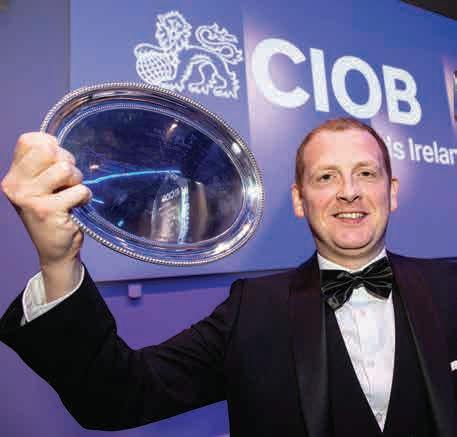
“
'EDUCATION CONTINUES
PLAY
MAJOR PART FOR US' PUTTING
P ublisher Patrick Aylward Editor Martin Foran martin@constructionmanagementireland.ie National Sales Manager Dermot Casey Dermot@constructionmanagementireland.ie Art Editor Jim Obey Ad Production Audrey Fitzgerald Construction Management Ireland Published by Ocean Publishing, 14 Upper Fitzwilliam St, Dublin 2 Tel: 01 678 5165 Fax: 01 678 5191 i Printed by WG Baird Ltd Antrim Whilst every effort has been made to ensure that the information contained within this journal is correct, the publisher cannot accept responsibility for errors, omissions or discrepancies. The views expressed are not necessarily those of the publisher. P.16 Talk to you soon, Martin & Dermot * The articles herein represent a snapshot in time in H1 2022. Always check with those concerned for the latest.
CHARGING INTO THE





We have always been committed to embedding sustainability into the core of our activities. However, we now recognise the urgent need for an acceleration in our sustainability ambition and performance.

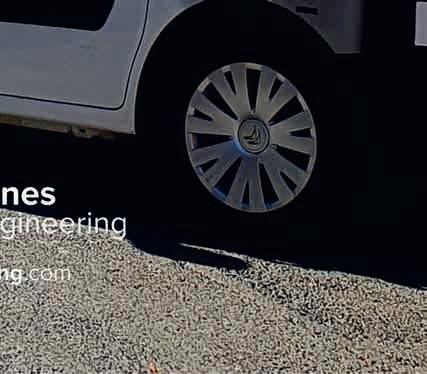


Our activities have an impact on our planet, the environment, the economy, and the communities in which we work; as such we are committed to ensuring environmental, social, and governance (ESG) factors are embedded across all our operation and supply chain activities. Through our careful Stewardship, we will seek to enhance the communities and environment in which we operate.



We are working towards setting clear measurable targets to reduce our use of fuel, and energy as well as materials, waste, water, transport, and other sources of emissions. We are also developing a plan to enhance biodiversity and the natural environment where we operate. Building on work that has already commenced, such as our deployment of new technology, we will continue implementing changes at our facilities to help them to become even more carbon efficient and reduce material waste.



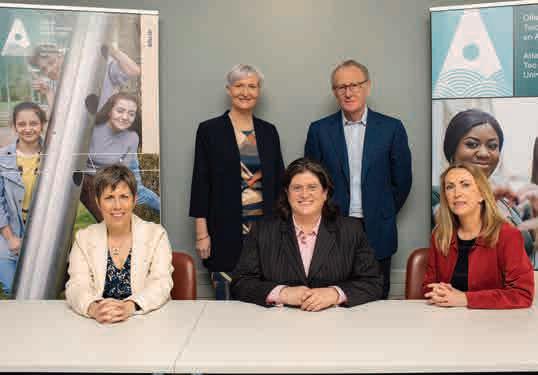

5 News Stories from the sector and wider economy 11 CIOB News Items of interest; including the announcement of the ‘Irish Construction Manager of the Year’ 20 Construction Management Conference A trip to Galway – in real life and in virtual reality 22 Project Notes Giving old building materials new life 24 Spotlight on: Dornan Continuing growth in Europe’s pharma sector 27 Lean Journeys Advancing the application of Lean thinking and practices for Irish construction 30 The Lie Of The Land Facts, figures and industry overviews 36 Training & Careers WIT courses, WorldSkills and more 43 Personal & Finance Want to be more innovate and creative? 50 Green Building With the Irish Green Building Council (IGBC) 55 Products & Services What’s caught our eye? 56 And Finally Jeff Haden rounds it all off CONTENTS 15 On The Record This time out our focus is on the SCSI 44 The Irish Concrete Soc iety’s Awards We take a closer look at this year’s winners 48 The New Atlantic Technological University ATU launched to a great welcome Cmi

David Bolton is the new Irish Construction Manager of the Year
David Bolton from Farrans Construction was named ‘Irish Construction Manager of the Year’ at CIOB Awards Ireland 2022, sponsored by Maor Scaffolding & Jan Janssens & Co, in Croke Park.

Work
David, having taken the gold prize in the Healthcare category, won for his work on the Altnagelvin Acute Hospital North Wing in Derry, Northern Ireland.
The £42m Altnagelvin Acute Hospital North Wing for the Western Health & Social Care Trust is a new entrance block and three-storey ward block, comprising six wards with a total of 144 adult single-bed rooms, isolation rooms, a renal dialysis suite, basement plantrooms and service tunnels, which was delivered during the peak of the Covid pandemic in 2020.
For more see CIOB News, this issue.
MOUNT SACKVILLE SECONDARY SCHOOL WINS CIF COMPETITION
Mount Sackville Secondary School in Chapelizod, Dublin has won this year’s overall Construction Industry Federation’s (CIF) Building the Future Award for its Radharc na Life (‘The Liffey View’) proposed housing development on Knockmaroon Hill, Castleknock, Dublin 20.

They edged out both New Cross College with its sustainable housing development proposal and Galway City Youthreach, to claim overall first place.
Mount Sackville Secondary School’s Radharc na Life (‘The Liffey View’) proposal was selected as it mapped out
a sustainable housing development on Knockmaroon Hill, Castleknock, Dublin 20.
Model
Created by students Orla Murphy
and Olwyn Berry, Radharc na Life, is based on an Earth ship model, which is a style of architecture developed in the late twentieth century to early twenty-first century by architect Michael Reynolds.
Earthships are designed to behave as passive solar earth shelters made of both natural and upcycled materials such as earth-packed tires.
The judges were particularly impressed how the students proposed to ensure Radharc na Life would have a zero carbon footprint.
NEWS Spring/Summer 2022 | Construction Management | 5
NEWS
Glenveagh to partner with the Irish Green Building Council for greener and healthier homes
Homebuilders, Glenveagh Properties PLC announced a new strategic partnership with the Irish Green Building Council (IGBC).

Work closely
This collaboration will see Glenveagh work closely with the IGBC to prioritise sustainability in its new housing developments.
Glenveagh’s ambition is to set a new benchmark in the sector by delivering the maximum possible social benefit at the lowest possible environmental cost.
It has committed to embedding sustainability throughout its business under six pillars.

As part of this, it is developing its transition to Net Zero.
Membership of IGBC is therefore timely and will facilitate a collaborative approach within the sector to take action on issues such as embodied carbon and the circular economy.
Glenveagh has already engaged with the IGBC’s Home Performance Index through the 463 residential
About Glenveagh
Glenveagh Properties plc, listed on Euronext Dublin and the London Stock Exchange, is a leading Irish homebuilder. Supported by innovation and supply chain integration, Glenveagh are committed to opening up access to sustainable high-quality homes to as many people as possible in flourishing communities across Ireland. They are focused on three
units in Citywest which are registered for this national sustainability certification.
Scaling up
Pat Barry, CEO at IGBC, said:
core markets – suburban housing, urban apartments and partnerships with local authorities and state agencies. ‘We are targeting to deliver 1,400 suburban homes in 2022 with a longer-term target of over 3,000 homes per annum,’ says Glenveagh. ‘The landbank we have assembled can deliver housing that is both in demand and affordable.’ www.glenveagh.ie
‘The Home Performance Index (HPI) certification is now scaling up rapidly and is being used by the largest housing developers in Ireland.
‘With more than 7,800 homes registered, the HPI is expected to reach up to 50% of all homes built in Ireland in the next couple of years.
‘We are delighted to have Glenveagh on board supporting Ireland’s shift to healthier and greener homes.
Excited
Lorraine Fitzgerald, Head of Sustainability at Glenveagh added: ‘We are very excited to join the Irish Green Building Council and to receive support to reach our ambitious sustainability targets as sustainability is core to the success of our business and of growing importance to our customers.
‘Having already focused on making our houses highly energy efficient, we are now working to reduce our embodied carbon and the emissions in our supply chain, and to succeed, we need to implement improvements together with our supply chain partners in many areas such as whole life carbon, circularity, and biodiversity.’
The Irish Green Building Council (IGBC) has launched a draft roadmap to decarbonise Ireland’s built environment across its whole life cycle.
For the first time ever, the report looks at the impact of the built environment and construction across its whole life cycle and at projections till 2030.
It also provides clarity on ways to mitigate these emissions.
Responsible
The draft roadmap shows
Roadmap to decarbonise Ireland’s built environment
that construction and the built environment are directly responsible for 37% of Ireland’s emissions, the same as agriculture.
This is made up of about 23% operational emissions associated with the energy we use to heat, cool, and light our buildings.
A further 14% of the emissions are embodied carbon emissions from the production of construction materials, transport of materials, construction process, maintenance, repair and disposal of buildings and infrastructure.
With 400,000 new homes to be built by 2030, there is a real risk to blow the construction and built environment carbon budget if embodied carbon emissions are not rapidly addressed, it is stated.
For more see Green Building in this issue
ABOVE: Pat Barry with Lorraine Fitzgerald
NEWS 6 | Construction Management | Spring/Summer 2022
Chadwicks lends its support to Cork family on DIY SOS SIG - new branch in Limerick
Chadwicks is delighted to provide support to Blackpool locals Adam Drummond and his parents, Marguerite and Brian, in the third series of DIY SOS: The Big Build Ireland
Exclusive
As the exclusive building materials supplier to the show, Chadwicks will provide a wide range of materials to facilitate a significant refurbishment of the Drummond family’s home to make it fully wheelchair accessible in just nine days.
Products provided will comprise of: gas boiler, piping and fittings
well as skirting, architrave
storage and shelving areas
flooring and earth wool decking for a new garden walkway
help complete the work.
Having played on an international level since the age of twelve, Adam Drummond (twenty-three) was on track to be one of the nation’s leading basketball stars having successfully secured two basketball scholarships in the United States in his late teens.
On returning home to Ireland in early 2020, Adam commenced his third basketball scholarship while studying Sports and Exercise
Management at Munster Technical University.
Injuries
However, tragedy struck in May 2021 when Adam fell from a significant height and was rushed to Cork University Hospital.
Adam sustained severe injuries as a result of the fall and his doctors advised that there was only a one-per-cent chance he would walk again.
Now, as a wheelchair user, Adam is beginning to navigate his new way of life but faces a difficult road ahead.
Adapt
His family is now seeking help from the DIY SOS team to adapt their home to facilitate Adam’s rehabilitation needs as well as create additional space to give him more freedom, comfort and independence in his home.
Commenting on the announcement, Phillip Burgoyne, Chadwicks Midleton Branch Manager, said:
‘The team at Chadwicks Midleton is delighted to show support to the Drummond family and support such a worthwhile project as DIY SOS: The Big Build

DIY SOS: The Big Build Series 3 will air on RTÉ in late 2022
SIG, the largest provider of specialist building products and technical expertise to the construction industry on the island of Ireland, has announced at time of writing that it is opening a new branch in Limerick city.
This will add to its existing branch network in Dublin, Cork, Belfast and Omagh.
Delighted
Commenting on the new branch opening, managing director of SIG in Ireland, Kevin Windle said: ‘We are delighted to announce the opening of a new branch in Limerick.

‘We have been successfully servicing our customers in the mid-west region for many years from our Dublin and Cork branches, but we believe that now it is the right time to increase our investment in the region by opening a new branch in Limerick.
Exciting
‘There are exciting plans in place for the development of Limerick city and the wider mid-west region over the next twenty years and we look forward to playing our part in their delivery, as key suppliers to the construction industry.
'As a result of this news, we are now looking to fill the following roles:
Assistants
To apply for any of the above positions, please forward your CV to hr@sig.ie Watch our latest videos: https://www.sig.ie/video-gallery/
Irish builders’ merchants to supply vital materials and services to adapt home of Adam Drummond
NEWS NEWS Spring/Summer 2022 | Construction Management | 7

Kirby Group Engineering awarded Engineers Ireland’s CPD Accredited Employer Standard
Kirby Group Engineering has been awarded the much sought after CPD Accredited Employer Standard by Engineers Ireland in recognition of their continuing professional development (CPD) strategy.
Founded in 1964 in Limerick, Kirby is a leading mechanical and electrical engineering contractor with operations in Ireland, the UK, and Mainland Europe.
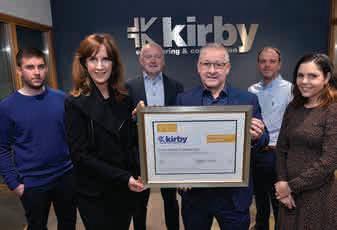
Services
The organisation provides full mechanical and electrical engineering contracting services as well as specialist high voltage (HV) and medium voltage (MV) design and construction services across a range of sectors including data centres, life sciences, industrial, energy and commercial.
With a turnover of €400m the organisation employs over 1,300 highly skilled professionals and has over 2,500 people deployed across Europe.
The Kirby Academy trains all key site staff to deliver its projects as a collaborative team with a world-class process.
In 2021, Kirby spent over €1m on training initiatives and has undertaken a €2m upgrade of its headquarters in Co. Limerick to keep pace with the predicted growth.
Congratulations
Congratulating Kirby Group Engineering on achieving the CPD Accredited Employer Standard, Caroline Spillane, director general of Engineers Ireland, said: ‘Investment in professional development is essential for organisations to grow and develop their people.
‘This investment ensures career progression and success for employees while also ensuring continued growth and market success, nationally and internationally.
‘I would like to congratulate Kirby Group Engineering for their dedication to professional development and achieving CPD Accredited Employer status.
‘It is clear that Kirby Group Engineering has a strong commitment to developing its people and will continue to benefit from the strategic approach facilitated by this standard,’ Ms Spillane added.
Approach
Said Mark Flanagan, group managing director of Kirby: ‘Our clients like our honesty, integrity and our values-based approach. Our success in winning repeat business has been driven by consistent delivery.
‘Every day we aim to deliver innovation through synchronised worldclass engineering and operational excellence and being a CPD Accredited Employer highlights these aims prominently.
‘We have a solid reputation of trust and integrity, and this trust has been earned by consistently delivering on our promise, going the extra mile, and being a values-driven business.
‘Our core values of People, Safety, Quality, Delivery and Value are central to what we are as a business, and there is a clear link between our core values and our success,’ Mr Flanagan added.
Strategic framework
The Engineers Ireland CPD Accredited Employer standard is a strategic framework which enables engineers and engineering employers to raise competency levels and deliver tangible business benefits by investing in engineers through continuing professional development.
For more information, visit: http:// www.engineersireland.ie/cpd-training/ cpd-accredited-employer-scheme.aspx
Business community marks 8th annual National Workplace Wellbeing Day 2022
Ibec has highlighted the increased demand for focus on employee health and wellbeing supports, as talent attraction and retention remain a key priority for businesses across the country.
These comments coincided with the eight annual National Workplace Wellbeing Day.
With many workers now returning to some form of office working after two years of being remote, the day provided ‘a unique opportunity for businesses to highlight available wellbeing supports for their staff, whether they be in the workplace, working from home or adopting a
hybrid-working model’.
Importance
Ibec CEO, Danny McCoy said: ‘It is clear from engaging with member companies that awareness of the importance of good workplace mental health and wellbeing has never been higher.
‘Coupled with this is a jobs market underpinned by an ever-increasing competition for talent.
‘Indeed, Ibec’s research shows that talent retention is the top priority for the majority of companies in Ireland.
‘We know that those organisations who embed a culture of wellbeing and
that support the mental and physical wellness of their workforce are the same ones who are more effective at ensuring the attraction and retention of employees. Demand
‘As such, wellbeing programmes are in higher demand as they reflect corporate support for individuals' mental wellbeing and acknowledgement of the need for an appropriate level of work-life balance.
‘National Workplace Wellbeing Day affords an opportunity to organisations across Ireland to showcase the steps that they have taken to support their staff in their wellbeing.
‘The day can also raise awareness for those organisations who are yet to initiate their wellbeing journeys.'
NEWS NEWS Spring/Summer 2022 | Construction Management | 9

David Bolton from Farrans Construction was named Irish Construction Manager of the Year at CIOB Awards Ireland 2022, sponsored by Maor Scaffolding & Jan Janssens & Co, in Croke Park.


David, having taken the gold prize in the Healthcare category, won for his work on the Altnagelvin Acute Hospital North Wing in Derry, Northern Ireland.
The £42m Altnagelvin Acute Hospital North Wing for the Western Health & Social Care Trust is a new entrance block and three-storey ward block, comprising six wards with a total of 144 adult singlebed rooms, isolation rooms, a renal dialysis suite, basement plantrooms and service tunnels, which was delivered during the peak of the Covid pandemic in 2020.
Fast-track
Following a request from the Trust to fast-track delivery of three wards in the Derry- Londonderry hospital to protect against a potential surge, David fast-tracked three wards for covid-19 facilities, handing them over eight weeks earlier than programmed, in the interest of public health.
The Herculean effort was greatly appreciated by the Client team. Dr Anne Kilgallen, Chief Executive of the Western Health and Social Care Trust, said:
‘Particular thanks go to Farrans Construction, their subcontractors and supply chain for their support and commitment to delivering this for the hospital, and in the face of extreme challenges to the construction sector.
David Bolton is the new Irish Construction Manager of the Year
‘Farrans went above and beyond to successfully deliver everything requested by the Western Health & Social Care Trust.’
Impressed
CIOB Awards Ireland judges were impressed with the passion, dedication, and expertise demonstrated by David.

He completed the complex project to a high quality of finish and workmanship in a live campus, whilst complying with all health and safety requirements in a demanding environment.
David displayed considerable skills in site organization and layout, construction planning, teamwork, supply chain management, communication, leadership, and effective
coordination, and an ability to bring the project to a conclusion within such a challenging environment, whilst ensuring the architectural and technical requirements of the project were fully realized. The adjudicators were impressed with the enthusiasm, passion and professional knowledge shown by David in the delivery of this complex construction project and, for these reasons, they were thrilled to award him the mantle of Irish Construction Manager of the Year 2022.
Other winners
Other winners in the Irish Construction Manager of the Year were Owen Stynes of Walls Construction for Dublin Landings Blocks 3, 4, & 5, who took the gold prize in the Commercial category, and Tadhg Kelly MCIOB from BAM who won the silver prize in the same category for the control tower building at Dublin Airport.
Pat O’Neill of Duggan Brothers took the silver prize in Healthcare for the Aberdeen Building at Peamount Healthcare. Woodvale Construction
dominated the Community category, with Robert Ewing FCIOB taking gold for his work on the NDFA Schools Bundle 5, and Paul Devine MCIOB winning silver for the St. Mary’s Parish Lavey project.
Trustee
Ivan McCarthy FCIOB, CIOB Trustee, said: ‘Built environment competitions often overlook the fact that people are the most important aspects of a project.
‘The Construction Manager of the Year Awards (CMYA) highlight what can be achieved when you mix talent with dedication and the appetite to go above and beyond.
‘Construction Managers are pivotal in project delivery, and we should all feel proud about the high level of such expertise that has been showcased.’
Thanks
The CIOB would like to thank the CIOB Awards Ireland sponsors for their generous support: Maor Scaffolding; Jan Janssens & Co; PJ Personnel; Arc Engineering; GDC Construction Services; Kilsaran; CITB NI; CIF; and Leonard Engineering.
ABOVE: Committee
ABOVE: David with Ivan McC arthy, CIOB Trustee
CIOB Spring/Summer 2021 | Construction Management | 11
Above: (l-r): Declan Fitzpatrick MCIOB (Clancy); Gary O'Neill; Conor Power; Svetlana Zavadska; Jordan Kinch & Brian Warren MCIOB (Clancy)
Another year and another successful CIOB Student Challenge Ireland has taken place. This year saw the team from WIT come out in front.
WIT WINS CIOB’S STUDENT CHALLENGE IRELAND 2022!
The Chartered Institute of Building (CIOB) is thrilled to congratulate WIT on winning CIOB’s Student Challenge Ireland 2022, which took place as a virtual event this year.
Congratulate
We would also like to congratulate the silver winners, Letterkenny IT, and the bronze winners, GMIT (now part of ATU).
The members of the winning team, Gary O'Neill, Conor Power, Svetlana Zavadska and Jordan Kinch were supported by their lecturer Brian Graham FICOB (see more from Brian in our training pages, this issue.)
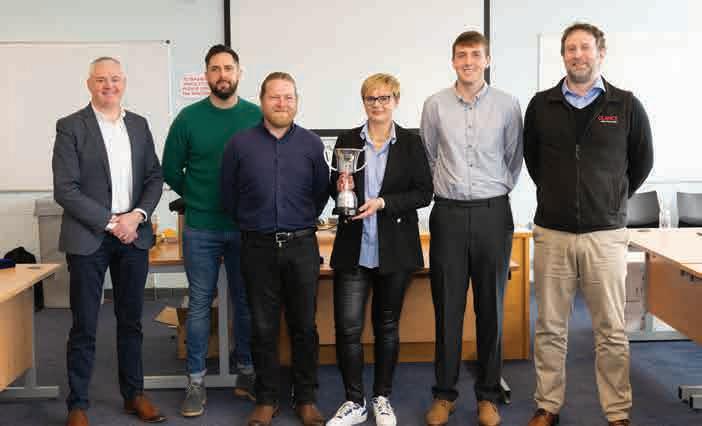
Brian said: ‘Waterford Institute of Technology are delighted to have won the CIOB Student Challenge this year.
‘This is a fantastic competition for students to participate in and reinforces two of the most important skills required to be a successful Construction Manager, teamwork and communications.
‘The quality of the presentations demonstrated the strength of the competition this year and I would

like to commend all of the teams on their fine performances.
‘I would also like to thank everyone from the CIOB Ireland for organising such a great event.’
Address
In his opening address to the Students, Mike Foy FCIOB, President of the CIOB said that ‘this sector is a base from which most other industries grow; it also a vital player in global issues like climate change and sustainability.
‘As I often say, if you want to solve the big problems join our industry because that is what we do, and your career can leave a legacy unlike any other.’
The event was attended by six third-level institutes from around the country.
Student teams of four were submitted from Dundalk IT, TUS Midwest, Letterkenny IT, MTU, GMIT and Waterford IT.
If you want to solve the big problems join our industry.’ – Mike Foy FCIOB, President of the CIOB
CIOB NEWS 12 | Construction Management | Summer/Spring 2022
Brief
The teams were provided with a brief on the morning of the competition, which required them to tender for the ‘design and build’ of a scheme of twenty family houses in an urban setting in the Midlands.
They had 4 hours to work on a report and presentation, highlighting what they believed to be the most important issues and how they would proceed with the work.
Each team then had fifteen minutes to present their work to the judges, followed by a Q&A.
Judges
Our panel of judges consisted of John Sweeney MCIOB, Roger Gillespie FCIOB, Hugh Dodd MCIOB, Katherine Dobbin and Dermot Russell FCIOB.
The winners were announced by Ivan McCarthy FCIOB, CIOB Trustee.
John Sweeney MCIOB, Head Judge and member of the CIOB Dublin Hub Committee, said:
‘The CIOB Student Challenge is a very competitive event, considering the timeframe in which the task must be completed, along with the added challenge of not knowing the content of the brief until just 15 minutes before the start of the competition.
‘The tasks requested were your typical construction management procedures that apply to any project.
‘This provided students with a real insight into what will be expected of them when they commence their own careers in construction management.
Impressed
‘I must say that the judges were extremely impressed by the standard of the presentations provided by all teams; the future looks bright for the
construction industry!
‘Special thanks to the Colleges and lecturers for supporting this event.’
CIOB Ireland would like to thank all of the colleges for supporting their teams in attending, as well as the judges of the event, who kindly gave up their time to make Student Challenge Ireland 2022 the success that it was.
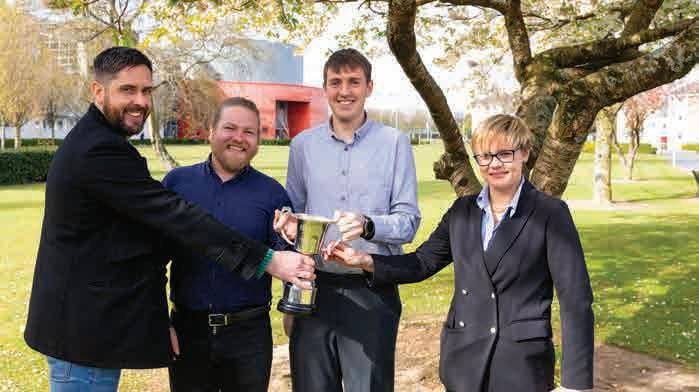
We would also like to thank our sponsors, the Construction Industry Federation and Lafferty, for their generous backing of our event.
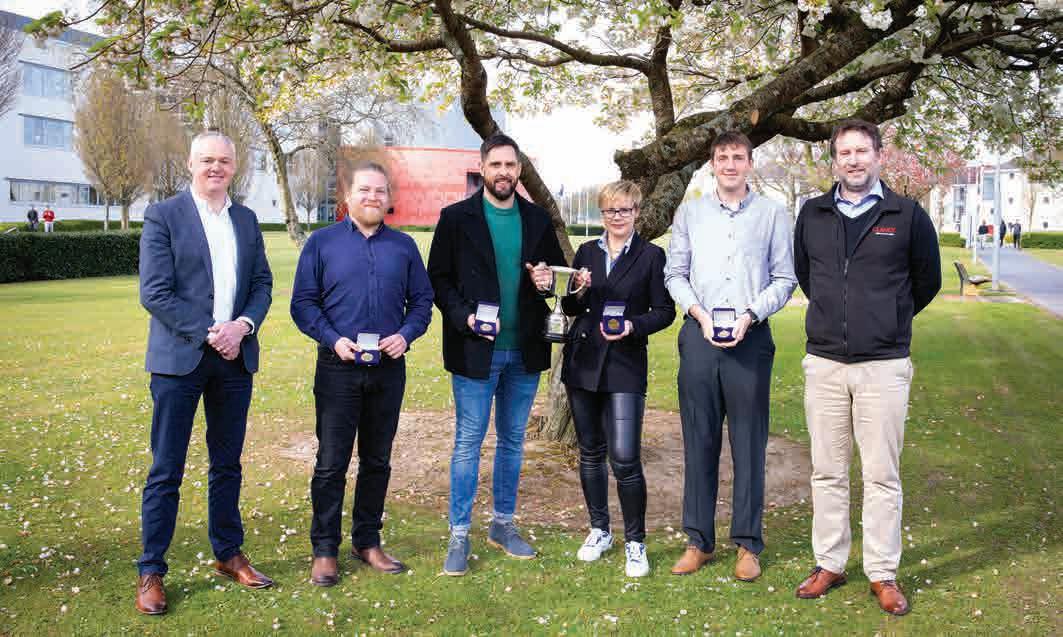 Above: (l-r): Declan Fitzpatrick MCIOB (Clancy); Conor Power; Gary O'Neill; Svetlana Zavadska; Jordan Kinch & Brian Warren MCIOB (Clancy)
Above: (l-r): Gary O'Neill; Conor Power; Jordan Kinch & Svetlana Zavadska
Above: (l-r): Declan Fitzpatrick MCIOB (Clancy); Conor Power; Gary O'Neill; Svetlana Zavadska; Jordan Kinch & Brian Warren MCIOB (Clancy)
Above: (l-r): Gary O'Neill; Conor Power; Jordan Kinch & Svetlana Zavadska
Summer/Spring 2022 | Construction Management | 13

STARK WARNING ON HOUSING TARGETS
The new President of the Society of Chartered Surveyors Ireland, Kevin James this summer warned that the property and construction sector is functioning with huge uncertainty over the future pipeline of construction projects due to the surge in construction inflation.
Affected
Mr James said both public and private projects were affected, as viability remains challenged across the country.
Addressing the housing supply issue, he said rising construction costs will put the Government’s ‘Housing for All’ targets under huge pressure.
‘We are clearly at a tipping point where some residential developments may or may not happen.
‘A lot of the increased costs are due to global supply chain issues, and we cannot mitigate increased shipping costs, the price of insulation, reinforcement, steel, plywood etc.
Focus
‘What the Government must do is focus on things within our control such as the planning process, the public procurement process, better
ABOVE: Kevin James has been elected President of the Society of Chartered Surveyors Ireland. He is pictured with Shirley Coulter, CEO of the SCSI and his predecessor TJ Cronin.
resourcing of local authorities, reducing ESB connection and site work charges, earlier engagement with Irish Water to avoid delays, greater flexibility around planning permissions to enable more costeffective materials to be used etc.
‘In order to keep costs under control its imperative the focus is put on these soft costs which make up roughly half the costs of delivering a new home.’
Mr James, who is originally from Derry, is owner and managing director of Cogent Associates, a Dublin based construction and propertybased consultancy service provider.

Education & career
He was educated at St Columb’s College and North West Regional College in Derry. He has a BSc in Quantity Surveying from Sheffield Hallam University.
He worked with Gardiner & Theobald in both London and Ireland for twenty years before leading a management buyout of the Irish business and rebranding it as Cogent Associates Limited.
Through his time in the UK and Irish construction industry he has gained extensive experience across a wide range of public and private sector projects for local and international clients.
He has been heavily involved with the SCSI for many years and is a qualified APC Assessor and a past Chair of the Quantity Surveying Working Group. He is a Fellow of the SCSI and RICS.
He is married with four children and lives in Blackrock in Dublin.
The new President of the Society of Chartered Surveyors Ireland is Kevin James. Construction Management Ireland recently checked with Mr James and heard a warning.
New SCSI President says cost inflation has pushed residential development to tipping point
‘IT’S IMPERATIVE THE FOCUS IS PUT ON THESE SOFT COSTS WHICH MAKE UP ROUGHLY HALF THE COSTS OF DELIVERING A NEW HOME.’
Spring/Summer 2022 | Construction Management | 15
ON THE RECORD
SCSI
– a unique overview

With a long and proud history behind it the Society of Chartered Surveyors Ireland (SCSI) goes from strength to strength with its uniquely holistic view


16 | Construction Management | Summer 2021 ON THE RECORD
Datingback to 1895 the Society of Chartered Surveyors Ireland (SCSI) is the independent professional body for chartered surveyors working and practicing in Ireland.

Partnership
SCSI works in partnership with the Royal Institution of Chartered Surveyors, ‘setting and maintaining the highest standards of competence and integrity among the profession and providing impartial, authoritative advice on key issues for business, society and governments.’
As it stands today the organisation is an amalgamation of several entities and has been through various name changes along the way, broadening to accommodate new member groups, growing to meet the challenges of the times.
In this way it has remained consistently relevant whilst maintaining its core values.
Speaking with immediate past president TJ Cronin in the final days of his term, it was clear that this is key to the success of the SCSI.
Merger
‘I come from the old Auctioneers and Valuers Institute,’ explains TJ. The merger, in April 2011 between SCS –as we were then – and IAVI created the current SCSI.
‘Since then we have continued to evolve with groups like Facilities Managers coming on board, for example.’
TJ refers to the SCSI as, ‘a broad church’ covering ‘the entire spectrum of the built environment’. A glance at its membership profile reveals just how true this is.
For starters, the organisation now has in excess of 5,000 members across Chartered, Associated and Student member categories.
‘We have twelve different professional groups in SCSI,’ TJ further explains.
‘They are roughly divided into three areas: Construction Surveyors, Land




Surveyors and Property Surveyors.
‘In the “Construction side of the house” as we call it, we have Building Surveyors, Project Manager Surveyors and Quantity Surveyors.
‘Within the Land Surveyors category there are Geomatic, Mineral, Planning & Development and Rural Surveyors.
‘In the Property sector you have Commercial Agency, Property and Facilities Managers and Residential Agencies, Valuations and Arts & Antiquities.’




Visualise

It’s a lot to take in, TJ agrees. When explaining the work that is carried out by modern surveyors – for example, to groups of students – he and his colleagues have developed a handy aid to visualisation.
‘Picture a field being surveyed for development,’ he urges. ‘Picture it being developed, a building being constructed, being negotiated, sold, let and managed thereafter.
‘Our members will be active at every stage and cover the entire cycle.’
Despite such a diverse range of activities there are of course common areas that underpin all of this activity and unite the members of SCSI across the board.
One of these is their ethos – which embodies as a central concept the idea of working for the common good –both for the members and for society at large.
This connects all concerned at macro level, TJ stresses. ‘In all that we do there will always be the question –will there be public benefit from this?’
It comes across strongly from chatting with TJ Cronin that SCSI sees a strong link between the professional member and his/her progression and successful career ‘journey’ and society as a whole – what is good for one is good for the other.
Connectivity
There is a huge sense of connectivity here; of singing off the same hymn sheet – made all the more impressive by that sheer number of sub-sectors covered by the organisation.
One area where this is apparent is in the attitude towards research.
The SCSI is of course heavily involved in research and has ‘a unique ability to zone in on specific information across the spectrum
whilst retaining an holistic view,’ says TJ.
‘All of our research is widely regarded as being evidence-based and realistic – reliable, unbiased information.
‘The thinking is that what is produced must not only benefit our members but society in general.’

Calculator
By way of example here, one of the foremost pieces of research carried out by SCSI is their ‘reinstatement calculator’.
It is widely used in terms of reinstatement values for residential premises and used by many stakeholders.
‘We produce this for the benefit of all,’ stresses TJ.
Looking to one of their recent reports, Dr Rosin Murphy, on behalf of SCSI, looked at how the concept of sustainability was embedded in academic courses and professional spheres.
‘It is purposeful and progressive,’ says TJ, adding that the ‘sphere of property is changing and we are in a unique position here.
‘We have various groups here that can provide massive in-depth knowledge into what is required in building.



‘We take things from across the spectrum to produce research that is very highly regarded and has great integrity.’
Board
The SCSI has a board of directors, subcommittees and Council. Feeding into Council they have four groups:
Regulation and Standards Group
Practice and Policy Group
Education and CPD Group
Membership & Public Affairs Group
Feeding into those in turn are their twelve PG groups and regional groups.
There are also two additional groups: Nexus, the young surveyors’ group, and ADR, the alternative dispute resolution group.
‘Shirley Coulter, CEO, joined just prior to Covid,’ explains TJ. ‘She has brought a great impetus and focus.
‘After she was appointed there was a huge amount of governance research and review and we agreed on a new



Spring/Summer 2022 | Construction Management | 17
structure.
‘It is, I believe, a really fluid structure. The parts of the organisation are working in tandem with each other.
‘We subsequently underwent a strategic review and introduced our Roadmap 2024
‘Part of the research on that included stakeholder interaction. The SCSI came out as unbiased and professional and knowledge- and evidence-based.’
Professional journeys
When it comes to career progression it’s all about individual professional journeys here.
Interaction starts with involvement with students and there are ‘career packs’ and class visits available for interested individuals, schools and colleges.
The engagement starts at school of course, and – as with colleges –engagement with secondary schools is ongoing.
‘We have a really dedicated Education team,’ says TJ. ‘Only recently I met with them at LIT in Limerick and we spoke to students there.

‘The following day there was a transition year educational event in Limerick which SCSI attended.’
Proactive
Clearly, the organisation is proactive and engages widely with both second and third level education.
In so doing, TJ continues to use that analogy of the field and how those in SCSI will be involved in every single stage of a build, from preparation and planning to long-term maintenance post-construction.
‘It is a very interesting talk to give to students,’ says TJ. ‘It crystalises for many the scope of opportunities here.
‘When they first hear the word “surveyor”, many people think of someone behind a theodolite or looking at the structure of a property.
‘A Chartered Surveyor now wears many hats. When you explain all of this you can see people thinking. “I never realised”.’
Focussed
This is particularly the case with second level students. Fast forward to third level education and you have, of course, a more focussed group of people – yet still they are only at the
starting point of their journey, stresses TJ.
Education does not grind to a halt upon graduation. On this note SCSI is very focussed on CDP (Continuing Professional Development).
‘When it comes to CPD twenty hours a year is the requirement,’ explains TJ.
‘We’ve adopted a framework, produced earlier this year, on a pilot basis. The intention is to launch it to all members next year.’
says TJ.
It is not bestowed lightly. You have to show you have the professional knowledge and the academic knowledge.’
Some ask, why should I have it? The truth, says TJ, is that there are many answers.
‘It is a standard of excellence and perceived by many as that,’ he says, for starters.
And chartership can of course be significant a point of difference for an individual professional.
‘Identity is a huge thing in business of course,’ says TJ. ‘We had a branding refresh a couple of years ago, refreshing the logo etc.
‘We also gave people specific branding they can use in stationery and emails to this end.’
Getting started
As for getting started there are many people that are willing to assist on this journey, says TJ. ‘If someone shows interest in becoming Chartered we work with them to achieve this.
Focused
The hours are the same, at twenty but it is to be more focussed. What the Education team at SCSI did was to look at ‘core competencies’, TJ notes.
Those core competences will now form the basis for CPD.
‘We will focus on core competencies in your own area,’ TJ explains. ‘What is a core competency for me is not so for a QS or someone in Geomatics of course.’
It is a massive undertaking, says TJ, but it is what is required – and it should be a huge benefit to the members – and to society in general, going back to that overriding ethos.
‘So far we have had a positive reaction,’ says TJ ‘but it is only being rolled out as we speak (May 2022). We are going around the regions, making people aware of what is happening.’
Chartership
The SCSI offers three memberships, Student, Associate and Chartered.
The Society awards the Chartered Surveyor professional qualification –an internationally recognised mark of excellence, in conjunction with RICS.
Chartership is a recognition of professional competence in your area,’
‘There is always assistance. The Education team is there to assist and, in a lot of cases, bigger companies will have their own pathways as they may have a number of staff members who have gone through this and can afford you the benefit of their experience.
‘But if that is not available within the company then SCSI can afford you the help you need – if you want to become Chattered then every option will be afforded you to do so.’
‘We are delighted to work with people in this regard.’
Virtual
Much of that and other work of course has pivoted to online in recent times.
TJ explains: ‘Covid has seen us come through a lot of changes and we have seen the absolute viability of virtual meetings and education and we are looking at developing new routes to membership.
‘Change was necessitated by Covid and we are evolving because of that to a point of progression.
‘I think geography was a big consideration before but I am confident that this will be addressed by remote learning and working.
‘It’s about working to not create barriers – and listening to what members and potential members are saying.’ Interview May 2022
18 | Construction Management | Spring/Summer 2022
ON THE RECORD

The 12th annual GMIT* International Construction Management Day Conference, sponsored by CIOB, SCSI, CABE, CIAT, and CIF returned (once again, virtually) for 2022 in the twelfth iteration of the event. As usual there was a packed schedule to get through!
GMIT International Construction Management Day Conference
Once again, the GalwayMayo Institute of Technology, (GMIT)* International Construction Management Day Conference took place ‘virtually’ this year and saw leading speakers from Ireland and the UK discuss topical issues affecting the built environment sector.
Organised by Dr Martin Taggart, lecturer, Department of Building & Civil Engineering, GMIT*, who acted as conference Chair, the event again saw a packed schedule and offered as usual, the inside track in terms of insights into the industry – taking in news, views and prospects as well as technical insights and, of course, the latest on working in times of Covid-19.
Other issues addressed included the housing crisis, cost inflation, supply chain issues and more besides.
Opportunities
Attendees heard about prospects and
opportunities in the sector, and about some of the innovations that are now shaping the industry – such as digitalisation and modern methods of construction.
The conference explored the topic of improving the quality of product delivery for customers too.
Welcoming delegates from right across Ireland and the UK, as well as a ‘wider band of followers from around the world’, Dr Taggart referred to how the event was free to attend, owing, he said, to the ‘fantastic support from our sponsors’.
‘This year we extended a warm welcome to the Chartered Institute of Architectural Technologists (CIAT) who were joining us for the first time as sponsors,’ he said.
During the event, Andrew O’Rourke, MCIAT, representing CIAT, shared his experiences and lessons learned regarding fire safety and other compliance matters, from his
work inspecting construction projects for BC(A)R compliance.
Speakers and programme
The conference kicked off with the Official Welcome and Conference Opening, featuring Dr Orla Flynn, President of GMIT* and President Elect of Atlantic Technological University*, Prof Graham Heaslip Head of School of Engineering, Galway-Mayo Institute of Technology (GMIT*) and Dr Martin Taggart.
The AECOM Annual Review (of the construction sector and its prospects), a popular regular feature of the conference, was delivered by John O’Regan, director, AECOM Ireland.
This was followed by ‘Quality Management and how to improve it!’ with Stewart McArthur, President of the Chartered Association of Building Engineers.
‘Education, Training & Skills in the Irish Construction Industry’ was the topic of a presentation by Tara Flynn, President of the
Master Builders and Contractors Association, director of Paul Flynn Construction and chairperson of the Construction Industry Federation (CIF) Western Region.

In conversation Tara Flynn’s presentation was followed by an Audience Q&A for the morning speakers and then ‘In conversation with Dr Martin Taggart’ looked at how the new Atlantic Technological University (ATU)* ‘will redefine built environment education in the Northwest of Ireland’.
Participants included Anne Boner, Head of Department of Civil Engineering and Construction, Letterkenny Institute of Technology; Mary Rogers, Head of Department of Building and Civil Engineering, Galway-Mayo Institute of Technology and Trevor McSharry, Head of Department of Civil Engineering and Construction, IT Sligo.
An overview of the government-
 ABOVE: Mar tin Taggart organiser
ABOVE: Mar tin Taggart organiser
20 | Construction Management | Spring/Summer 2022
CONFERENCE REPORT
funded National ‘Build Digital Project’ for the construction sector followed with Dr Avril Behan, Technological University Dublin.
The Build Digital project is a collaboration of TU Dublin, CitA, GMIT* MTU, UCD and WIT.
‘Job Quality in the Irish Construction Sector – a CIOB Report’, was delivered by Joseph Kilroy, Policy & Public Affairs Manager Ireland, Scotland & Wales – The Chartered Institute of Building (CIOB).
‘The Assigned Certifier –implementing the role’ looked at ‘challenges faced with design, regulation interpretation and achieving compliant construction on site with a focus on fire safety matters.
This was delivered by Andrew O’Rourke, Assigned Certifier, i3PT Certification.
Q and A
An audience Q and A with mid-morning
speakers was followed by lunch and then the conference examined, ‘The use of Virtual Reality and Augmented Reality in Digital Construction’ with Karol Dempsey, Lecturer, Letterkenny Institute of Technology and Eleanor Diver, Lecturer, Letterkenny Institute of Technology.
‘The SCSI / PwC Construction Market Monitor Report –Current Industry Sentiment’ was delivered by Kevin James, of the Society of Chartered Surveyors Ireland (SCSI) and managing director, Cogent Associates.
Attendees then heard about ‘Experiences in the use of Modern Methods of Construction (MMC)’ with Niall Hanley, contracts director, JJ Rhatigan Building Contractors.
‘Fulfilling the Aspirations and Opportunities of Ireland’s New “Housing for All” Plan’ was
delivered by James Benson, director of the Irish Home Builders Association (IHBA), director of housing, planning and development services at the Construction Industry Federation.
Wrap up Dr Martin Taggart wrapped up the event along with Professor Graham Heaslip, Head of School of Engineering, GalwayMayo Institute of Technology.
Martin Taggart looked forward to future years when the Conference might well return in a ‘live’ setting and thanked all involved for their support over the
years to date.
Looking forward, Dr Taggart explained: ‘We will transition to ATU from 1 April 2022 and join with our partners from IT Sligo and Letterkenny IT to form a much larger and better resourced entity offering potential to drive change in the future in our corner of Ireland’.
On a separate note, he noted how, post-Covid ‘there is a huge demand for our students.
‘Anecdotally, we hear a lot of people are changing jobs and making career changes also.’
Programmes
For anyone in that situation or anyone thinking of returning to education there are many new programmes, said Martin Taggart and a lot ‘are aimed at those working full-time and offered in blended format’.
These included, he said, such areas as Building Information Modelling and Built Environment Regulation and Circular economy.
*From 1 April 2022 GMIT amalgamated with Letterkenny IT and IT Sligo to form the Atlantic Technological University (ATU). www. atu.ie

MARTIN TAGGART LOOKED FORWARD TO FUTURE YEARS WHEN THE CONFERENCE MIGHT WELL RETURN IN A ‘LIVE’ SETTING
Spring/Summer 2022 | Construction Management | 21
This time out we look to Limerick where a very special resuse and repurpose programme is taking place.
Giving old building materials new life
Opera Square’s sustainability programme
Limerick’s Opera Square is breaking new ground in the construction industry’s sustainability drive thanks to a unique reuse and repurpose programme that is giving new life to stone and brick that would otherwise be discarded.
Historical
In addition to the retention of sixteen buildings deemed to be of historical importance on the site, conservation is also stretching to diverting huge volumes of materials from the demolition programme over the past twelve months into other projects elsewhere in the city and county.
In a novel three-way partnership overseen by the Southern Region Waste Management Office and in conjunction with Opera Square developer Limerick Twenty Thirty and demolition and works contractor John Sisk & Son, over 1,000 tonnes of stone and brick materials alone that would otherwise have been destined for landfill have been salvaged and are being put to good uses.
The ‘reuse’ programme commenced with what was the country’s first ever
pre-demolition audit, which identified in advance of demolition works which materials could be reused.
Among the projects the materials have since been diverted to are the Foynes Flying Boat museum, the Canal Harbour Building and bridge and old stone wall repairs around the county.
Training
Significant volumes also have been diverted to training programmes for young stone masons, which has been supported by the Economic and Social Intervention Fund through Limerick City and County Council Regeneration programme.
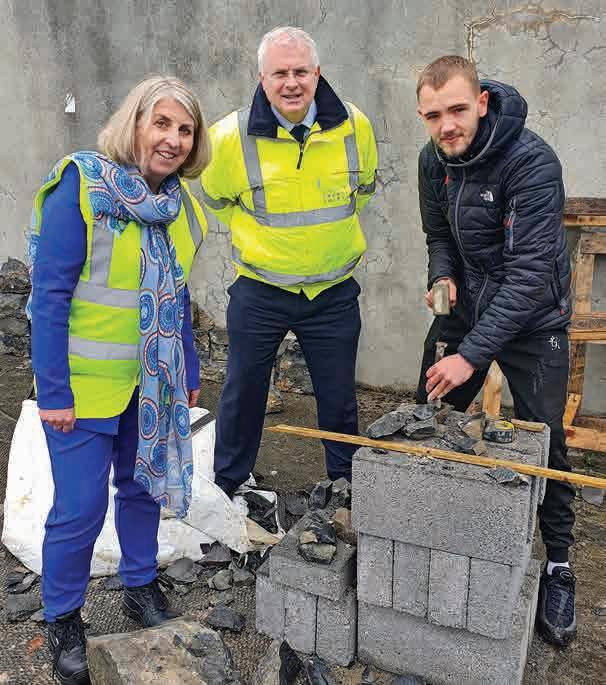
It’s not just brick and stone that’s getting a new lease of life.
Other ‘reuse’ materials include palisade fence panels, which have been sent to Richmond Rugby Club; the metal gate and stone pillars from the entrance to the Granary Building, which are currently with the Civic Trust and items such as the historic limestone door case at 6 Rutland Street and cobble stones retained on site for future use.
Modern materials have
also been segregated for reuse on the development including carpet tiles, ceiling tiles, timber, and glass.
The materials have been drawn from the site since the demolition and enabling works on the 1.62hectare project a year ago.
Largest
Opera Square is the largest single commercial property development undertaken outside the capital.
The construction programme will see up to 500 people employed at peak output on the site.
When fully developed, the site will have the capacity for up to 3,000 employees across a 550,000 sq ft campus accommodation plus carparking and ancillary areas.
The programme will take up to six years to complete at an estimated cost of €250m.
Oversees
Philippa King, coordinator with the Southern Region
Waste Management Office – which oversees waste strategies for seven local authorities in Munster as well as Carlow, Kilkenny and Wexford – said that recycling and reuse programme has the potential to be a template for major projects involving large-scale demolition.
‘Outlets for construction and demolition waste are limited, so we had to explore alternatives to waste creation and did this from the very outset with the Opera pre-demolition audit.
‘The focus has ultimately been about diverting as much from waste as possible and we were not just talking about reuse alone but also repurpose and remanufacturing as well.
‘Our goal was to maximise resource recovery on site as the buildings were demolished and I think we’ve achieved that.
‘A key objective for Limerick today is to embrace international environmental NOTES
22 | Construction Management | Spring/Summer 2022
PROJECT
best practice on the circular built environment and what’s happening at Opera is a great example of that.’
Integral
David Conway, CEO at Limerick Twenty Thirty, said that sustainability is integral to all its projects.
‘We have already set a new standard in terms of sustainable development with our first project, Gardens International, and we are going to maintain that standard with the Opera Square site and with the Cleeves Riverside Quarter and every single project we work on, big or small.
‘However, what this project shows is that we are not alone going to have an environmentally proofed finished product but every step along the way is going
to be as sustainable as possible.’
Manager
Shane O’Donovan, general manager – Special Projects with contractors John Sisk & Son said:
‘Pretty much anything we can reuse on site is staying here. Of the other materials, we’ve managed to recover over 1,000 tonnes.
‘We’re delighted to see it being reused and we’re also very happy that some is being used in training apprentices in the use of stone and stone masonry.
‘The apprentices are cleaning and dressing the stone and preparing it for reuse on projects around the city and county, such as wall repairs and graveyards and the like. That’s a really positive output as well.’

About Opera Square
The 3.7acre Opera Square project will be a landmark commercial development in a regional and national context and one that will reflect Limerick’s status as a leading city in sustainability and innovation.
Funding
The 1.62hectare project is fully funded, thanks in the main to €170m funding from the European Investment Bank and the Council of Europe Development Bank loans.
Project managers have been appointed and the project is underway with enabling and demolition works ahead of construction commencing this year (at time of writing).
A transformational project for Limerick, the fully developed site will be capable of employing up to 3,000 people across a 550,000 sq ft campus accommodation.
Sustainability will be at the heart of Opera Square’s design and build, with the project developed to international best practice ‘Leadership in Energy and Environmental Design (LEED) Gold’ and ‘nZEB’ standards.
Transform
A day-time employment hub, it will transform into a bustling night-time destination complete with restaurants, bars and open entertainment spaces.
The design will also be entirely complementary to and protect existing important Georgian architecture.
‘Opera Square will not just be a modern cutting-edge development for leading national and international companies and organisations, it will be transformational for Limerick city, deliver significant employment opportunities and act as a catalyst for other major city centre investment to follow.’
Spring/Summer 2022 | Construction Management | 23
Dornan continuing growth in Europe’s pharma sector

The requirement for extra vaccine production and distribution with advances in bringing gene and cell therapy (CGTs) innovations to commercialisation to name but a few, has necessitated robust development in constructing the next generation of biopharmaceutical production plants.
Dornan are specialists in providing end to end solutions for Mechanical, Utility piping, HVAC, Electrical and Instrumentation expertise to the construction industry. Our dedicated teams are experts at meeting the regulatory requirements in the life science environment, supporting the delivery of advanced manufacturing facilities which are complex and highly customised.

Closely
Dornan aligns closely to our client’s project roadmap to understand the manufacturing pipeline and the products they are bringing to market.
The COVID-19 pandemic highlighted the importance of the pharmaceutical sector’s ability to adapt quickly to respond to health crises.
Dornan responds to industry demands in retrofitting facilities to enable pharmaceutical clients, to switch functions to expanding sites to scale up production.
The engineering and construction industry plays a critical role in helping the pharmaceutical sector respond quickly and efficiently to rapidly changing demands and environments.
Transformative
CGTs have quickly emerged as one of the most transformative innovations in biopharmaceuticals in recent times.
These plants are manufacturing bespoke products such as CAR-T cell therapies which are made to order for each patient.
This means that, with no inventory, the production facility cannot shut down, in addition there are vast concentrations of utilities going from the clinical laboratories to the production suites.
Understanding these types of challenges allows us, not just to meet requirements but also provide solutions at installation, facilitating critical utility maintenance without shut down.
Our mechanical and electrical installations also meet future demands enabling the facility to be both flexible and scalable.
Strategy
Our strategy is to deliver a safe and sustainable facility through our innovate concepts, ensuring tight controls and formulated solutions to advance the project timeline.
We use enhanced BIM and VR technologies in conjunction with bespoke collaborative software solutions to build real-time communication channels and reporting lines, helping to reduce or eliminate rework and construction creep.
Our integrated project delivery expertise, plus our modular and prefab capabilities generate efficiencies in design and offsite construction in a safe, controlled environment, with assembly strategies that reduce waste and increase productivity.
Challenges
The fallout from Covid-19 and the current geopolitical risks pose new challenges to the construction industry.
Dornan has fostered strategies to identify and manage supply chain risk and work with our suppliers to source critical components to circumvent delays and ensure continuity of supply.
We mitigate risks such as resourcing capacity through developing harmonised teams to deliver complex projects to tight schedules within budget.
Dornan closely manages our resource baseload; we blend our talent to meet the needs of the project and work flexibly across different execution delivery models.
This empowers us to concentrate and deploy our expertise where needed, reducing the number of people required on each team while increasing capability to the project.
Hires
Within our pharma business stream, Dornan made several strategic hires in 2020 and 2021 to support ambitious growth plans in our European operations.
This has enriched our talent pool which we retain and nurture through investment and internal progression paths and this has been key to our growth strategy.
Our clients demand excellence in project delivery and at Dornan our commitment is to exceed their expectation in terms of safety, quality, and value for money.
Proud
Dornan is pleased to be a proud sponsor of Rachel Blackmore and would like to pay tribute to her hard work and outstanding success over the past number of years and recently in the Champion Hurdle and the Gold Cup at Cheltenham 2022.
All at Dornan and the whole country celebrate our Tipperary trailblazer, who proves that age or gender is not a barrier to chasing and achieving your dreams.
If you are interested in joining Dornan’s talent and success, please email recruitment@ dornangroup.com
24 | Construction Management | Spring/Summer 2022
SPOTLIGHT ON: DORNAN


Lean Construction Ireland, with over 1,700 members, continues to deliver practical support and knowledge to the Irish construction industry as more and more companies embrace Lean thinking and practices to deliver efficiencies within their projects as well as to achieve operational improvements within their organisations.
Advancing the application of Lean thinking and practices for Irish Construction
Lean Construction Ireland (LCi) is a not-for-profit, membership-based organisation with a vision to transform the Irish construction sector through the adoption of Lean thinking and practices as part of the design and construction process, and move the industry towards more efficient, cost effective and collaborative approaches where projects are Delivered Better, Faster and Together
Reaffirmed Increased regulation around construction and the built environment, combined with international competition and the impact of Covid-19 has reaffirmed the importance of improving efficiencies to reduce project delivery costs and delays whilst ensuring the highest build quality is maintained.
With many Irish companies in the Architectural, Engineering and Construction (AEC) sector seeking to better understand those Lean tools and techniques that are available to assist deliver projects in a more efficient manner, as well as wanting to understand how these Lean tools and techniques are deployed and utilised, Lean Construction Ireland has developed a suite of resources that will assist companies understand and embrace Lean to deliver projects better and faster, and through effective teamwork and collaboration realise value for all involved in the project delivery process.
Some of these resources include:
The LCi Lean Pass Course
The aim of the course is to provide
participants with an introduction to the fundamentals of Lean and Lean in Construction, and to enable construction personnel speak the same Lean language onsite and in the office.
This course is delivered by third party organisations who have had personnel approved by LCi’s Capability Development Evaluation Panel as Lean Pass Trainers, and to date there are twenty-two Lean Pass Trainers with some 1,500 personnel from across the Irish construction sector having successfully completed the Lean Pass Course.
Details of the Lean Pass course are available on the LCi’s
In response to the needs of the Irish construction sector LCi is currently putting plans in place to develop Intermediate and


Spring/Summer 2022 | Construction Management | 27
LEAN JOURNEYS
Lean Construction Ireland National Conference
On 2 November 2022 LCi will hold its fifth national Lean conference which will bring together over 550 representatives from across the Irish construction sector, including delegates from overseas, in Croke Park Stadium Dublin.
Attending delegates will have the opportunity to learn about Lean in construction and listen to over twentyone presentations from national and international industry leaders and Lean experts, from both public and private sectors, on how they can leverage the benefits of Lean concepts to deliver quality projects that are safer, faster and more efficient – leading to increased stakeholder satisfaction and customer
value for money.
The depth and breadth of knowledge within the LCi Board is second to none and with a vision to d elivering projects better, faster and together – anyone working within the Irish construction sector will certainly benefit from becoming a corporate member of LCi.
Website
Lean Construction Ireland encourages all stakeholders within the construction sector to visit their website for further information about Lean, how to get started, LCi commended Lean service providers, Book of Cases, Approved Lean Pass trainers, as well as detailed information on Lean thinking, practices and tools.
There are some excellent resources such as case studies and webinars which are constantly being added to the website.

See www.leanconstructionireland.ie for further details.
Lean Construction Ireland Annual Book of Cases
– third in a series of Lean initiatives within Irish construction
Lean Construction Ireland (LCi) is a community of learning and practice that advocates for the transformation of the Irish construction sector through the adoption of Lean thinking and practices by the entire sector to enable and sustain enhanced effectiveness, efficiency, productivity, and profitability for all stakeholders in the value chain.
Core

A core LCi principle is that the open exchange of knowledge, information, and experiences around good Lean practices is a fundamental factor in the sector’s adoption of Lean and its transformation journey.
So, it was with great pleasure that Lean Construction Ireland launched the third publication of its Annual Book of Cases earlier this year – the key Lean Construction reference publication for the Irish construction sector, from Clients and Owners to Professional Services Providers, Contractors, Sub-Contractors, Suppliers, Consultants, and Academia.

The Book provides real-world, practical, and accessible examples of Irish Construction sector organisations implementing Lean thinking and practices.
Each case provides the context for the Lean initiative; details the Lean thinking, tools, and techniques applied on the initiative; and describes the impact and benefits of the initiative.
Demonstrate
These cases clearly demonstrate that the Irish construction sector is making significant progress in understanding and implementing Lean thinking and practices on capital project delivery as well as for internal operational excellence, adding real value for all project stakeholders and business owners.
To download a digital version of the Lean Construction Ireland Book of Cases 2021 please visit: www.leanconstructionireland.ie
Advanced Lean Pass Courses and these are scheduled to be launched later in 2022.
28 | Construction Management | Spring/Summer 2022
LEAN JOURNEYS

















P&D Lydon LTD Civil Engineering & Plant Hire Contractors OTHER SERVICES AVAILABLE AT OUR NEW PREMISES AT CROSS INCLUDE: Hydraulic Hose Manufacture and Repair Air Conditioning Diagnostics and Service Van, Plant, Truck and Agri-Machinery Parts and Consumables Sales Sale and supply of Sand, Gravel, Top Soil & Decorative Pebbles T: 094 9546099 E: info@lydon.eu W: www.lydon.eu Knock South, Cross, Cong, Co. Mayo, F12 C2R4
Construction activity
Q1 2022
‘The results from Q1 2022 highlight the continued resilience of the construction industry against the backdrop of multiple unique challenges – rising material costs, disruption of supplies, Brexit, the pandemic, rising fuel costs and other impacts of the war in Ukraine’, said Construction Information Services who continued as follows:
Across the island new project starts rose to just over €3bn for the quarter, the third highest quarter value recorded in the last three years, behind Q2 2021 (€4,4bn) and Q3 2021 (€3.2bn) and up form a three year quarterly average of €2.3bn.
Variations
There are variations of course across sectors. New starts in the residential sector fell for the third consecutive quarter to €979m (excluding new phases of existing developments).
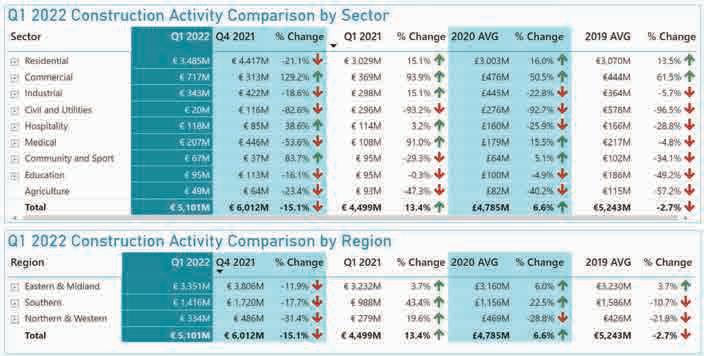
In the non-residential sector starts rose in Q1 to €1.2bn, a 27% rise on the quarterly average over the last three years.
Indeed, the only sectors falling below the previous three-year average for new starts were medical, retail and hospitality.
Significant
New starts in the civil sector rose significantly to €978m outstripping the previous three-year quarterly average of €274m and driven by new investments in wind and solar projects.
The construction pipeline (plans submitted and granted) remained steady in the quarter across the island with activity falling in education, community-based projects and for residential in Northern Ireland.
NOTE: The Irish economy was in virtual lockdown in Q1 2021 and comparative figures for Q1 2022 should be considered in this context in relation to on-site activity for new starts.
Resilience Against a Backdrop of Unique Challenges
Once again it’s time to check in with our valued contacts at Information Services CIS to get the lie of the land! And once again it makes for very interesting reading.
30 | Construction Management | Spring/Summer 2022
Construction
Q1 2022 PLANNING APPLICATIONS ROI PLANNING APPLICATIONS¹ Residential Non residential 1 Excluding Self Build and Student Accommodation applications Q1 2022 planning applications ROI CIS
Q1 2022 PLANNING GRANTS ROI PLANNING GRANTS²
2 Excluding self-build and student accommodation applications
Q1 2022 Planning Grants
ROI
Residential residential applications at €1.9bn, f
Non-residential
m - down 19% from Q1 2021.
PROJECT STARTS
The Irish economy was in virtual lockdown in Q1 2021 and comparative figures for Q1 2022 should be considered in this context
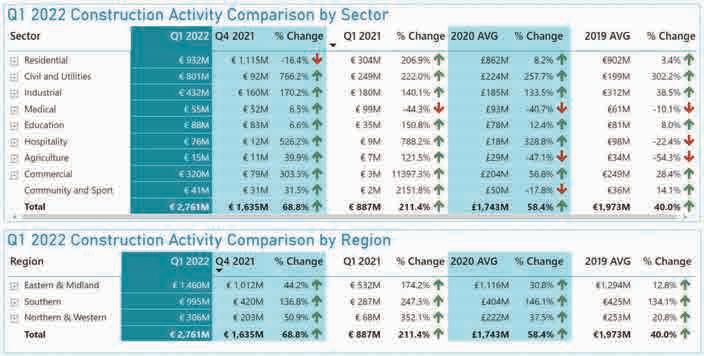

Residential
the same rate th all within Leinster.
Non-residential oject starts in Q1 2022 equating to just over €1bn n coming close to doubling the average.
Spring/Summer 2022 | Construction Management | 31
Mitchell McDermot industry overview
The construction costs of a two-bed midrange apartment increased by 14% or €27,000 during covid, according to a report.

The report early in 2022 by leading consultants Mitchell McDermott found that the hard costs of building a two-bed, standard spec, medium rise suburban apartment was now €219,000.
Dramatic
The main reason for the increase is the dramatic rise in the price of materials which occurred during covid with the cost of timber increasing by 86%, windows by 61%, steel by 52% and sanitary ware by 20%.
The €219K figure excludes indirect costs, parking, siteworks and VAT.
If those are included the total cost of delivering the apartment was in the region of €440K.
If this apartment was to be viable, the sales price would have to be in excess of €440K.
Predicts
Paul Mitchell, one of the authors of the report, predicted construction costs would increase
by 6 to 7% this year.
‘Emission restrictions in China has led to a reduction in steel supply while major post-covid building programmes in the US and Europe are driving the demand for timber.
‘One would expect a lot of the cost spikes to correct themselves in the short- to medium-term once supply chains return to normal.
‘That said the situation in the Ukraine will cause additional supply chain issues for certain materials.’
According to the report there was a 30% increase in the number of judicial reviews taken against Strategic Housing Developments (SHDs) last year.
Housing According to the report 20,000 residential units –5,000 of them, apartments – were completed in 2021.
Mitchell said the fact 20,000 units were completed – even with sites closed for 30% of the working year – was a positive.
‘This implies that the number could have been close to 30,000 units if it wasn’t for the lockdowns and shows what is possible.'
It’s been an interesting time in Construction, no surprise then that Mitchell McDermot’s Annual Construction Sector Report made for such interesting reading!
32 | Construction Management | Spring/Summer 2022 HOW THE LAND LIES ‘ACCORDING TO THE REPORT 20,000 RESIDENTIAL UNITS – 5,000 OF THEM, APARTMENTS – WERE COMPLETED IN 2021.’
The Tender Price Index has been published by the Society of Chartered Surveyors Ireland, Construction Management Ireland reports.
SCSI says commercial construction prices rose by 7.5% in H1 2022 –surpassing Celtic Tiger era peaks
TheTender Price Index published by the Society of Chartered Surveyors Ireland shows the rate of construction price inflation increased by 7.5% in the first half of 2022, up from 6% in the second half of 2021.
This is the highest sixmonth increase recorded since the SCSI began tracking commercial construction inflation figures in 1998; higher even than the 7.4% recorded during the Celtic Tiger era in the second half of 2000.
According to the SCSI’s index – which is the only independent assessment of commercial construction tender prices in Ireland – this brought the national annual rate of inflation –July 2021 to June 2022 – to 14% - up from 13.4% in the previous report.
The report indicates little variation across the regions with the rate of inflation in Dublin at 7% while it’s 8% across the rest of the country.
What’s driving construction inflation
Kevin Brady, Chair of the Quantity Surveying Professional Group in the SCSI said the current levels of construction inflation were due to a series of exceptional events.
‘During the last six months we’ve recorded
the highest ever rate of construction inflation increase since we began tracking it twenty-four years ago,’ he said.
‘This is largely due to the impact of the war in Ukraine, which is causing high energy prices and exacerbating the inflationary pressures on construction materials.
‘In the previous six months the main issue was material price volatility due
to supply chain issues while during the first half of 2021 it was pent-up demand for construction services as we emerged from covid lockdown.
High demand
‘In addition to these external issues, high demand over the last year and a half has been compounded by severe labour shortages and rising labour costs.
‘As the sector struggled
to deal with this series of unprecedented events, construction inflation has risen by a record 22% over the last 18 months.
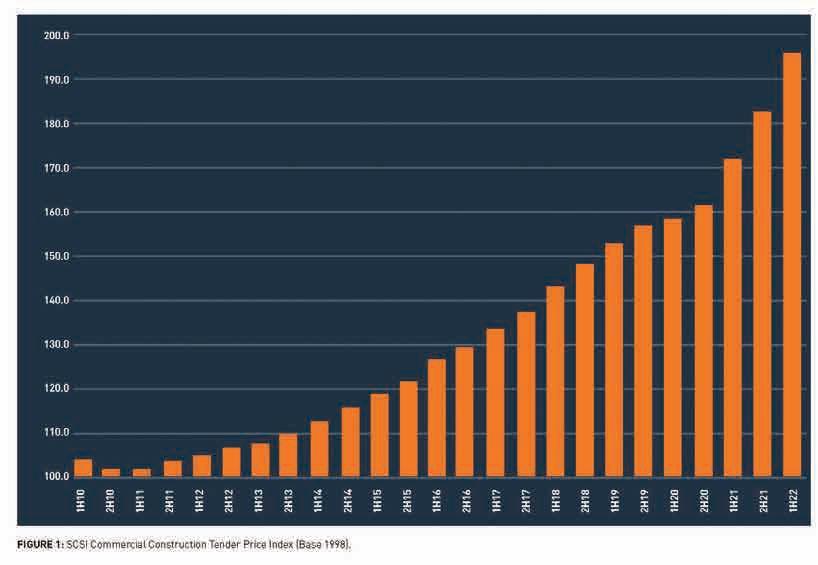
‘These are significant increases, and their continuous nature is adding tremendous pressure on the sector in terms of viability for projects.
'It had been anticipated that the increases we saw in the second half of last year following the reopening
Fig 1. Construction Tender Prices 2010 – 2022 The sentiment survey, which is based on responses from Chartered Quantity Surveyors from all round the country, working on commercial projects, was conducted in June 2022. The SCSI said the latest figures are based on median values rather than averages, as this gives a more accurate reflection of the responses it receives.
Spring/ummer 2022 | Construction Management | 33
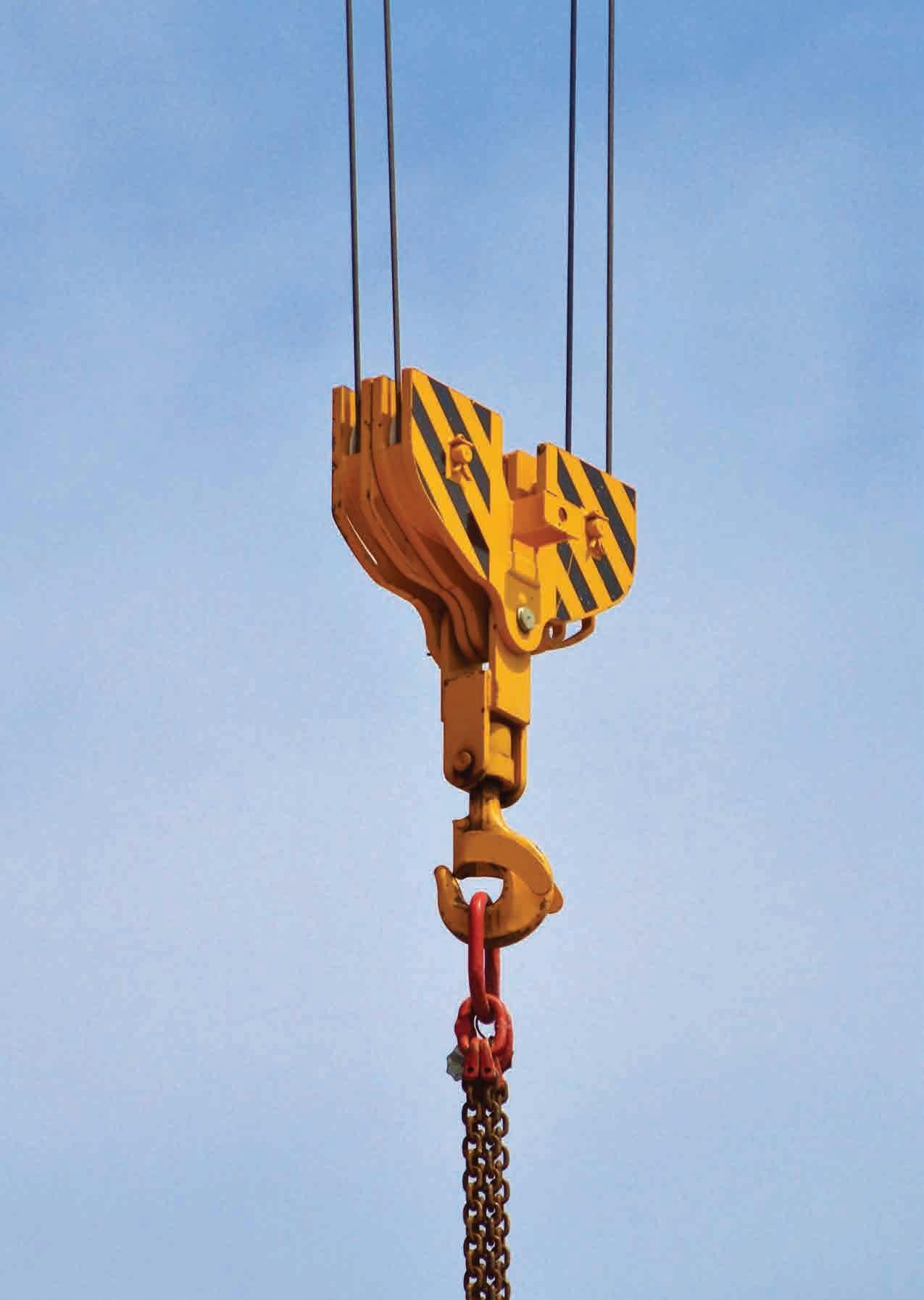
34 | Construction Management | Spring/Summer 2022 HOW THE LAND LIES
of the industry after covid restrictions would stabilise as supply chains and demand adjusted in the first half of this year.
‘However, the war in Ukraine has continued and has resulted in a sustained rise in inflation.
‘The products which are seeing the highest increases include insulation, plasterboard and sanitaryware.
‘Rebar – steel used in reinforced concrete and copper - is down while the price of timber products – softwoods, OSB boards, plywood etc – remain high but the rate of increase is levelling off,’ Mr Brady said.
Focus for future should be on reducing soft costs
The President of the SCSI, Kevin James, said that while it was extremely challenging to accurately predict future tender rates given current market and geo-political uncertainties, chartered quantity surveyors expected to see further inflationary increases in the second half of 2022 but at a lower rate than that recorded over the past 18 months.
He said the fact construction inflation levels were now surpassing those of the Celtic Tiger era meant the Government had to take urgent action.
‘Whilst activity within the construction sector remains extremely high across all regions, our members have indicated continued concerns regarding affordability and viability in relation to projects on the back of significant increases since 2021.
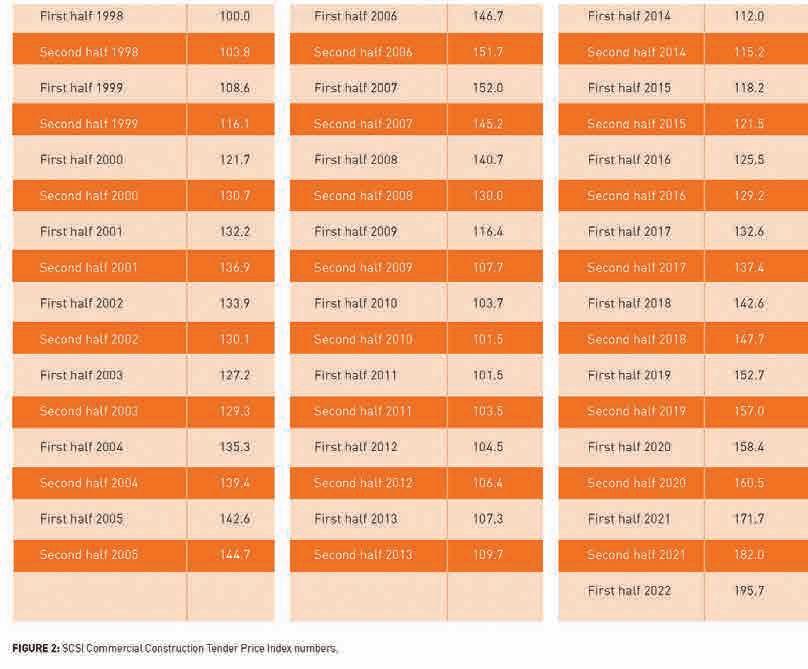
Welcomed
‘Commitments by Government to reform planning procedures is welcomed by the SCSI.
‘The SCSI believes Government should reduce
overall levels of risk and costs of delivery where they can such as reducing planning delays and timelines.’
Mr James said that if there was an economic slowdown it will likely lead to greater competition in the market.
‘Our members are reporting that currently the industry is near peak capacity; however, given that the threat of a downturn in economic activity is being widely predicted, we could see capacity coming back into the market.
‘This could lead to a reduction in the pipeline of
work and encourage more competitive tendering as a result.’
Caution
Looking ahead to Budget 2023 the SCSI cautioned the Government against introducing further taxation on commercial property transactions.
Mr James said that while activity within the construction sector appeared strong – led by new industrial and logistic developments in particular – other areas, such as retail and some office types had
seen declines due to covid and viability issues.
‘In Budget 2020 stamp duty on commercial transactions was increased to 7.5%.
‘We’re calling on Government to refrain from further increases, as such interventions cause uncertainty in the market and act as a deterrent to investment. In the current environment we don’t need further uncertainty,’ Mr James concluded.
Spring/ummer 2022 | Construction Management | 35
Having launched the first Construction Management degree in Ireland in 1986, Waterford Institute of Technology (WIT) continues to innovate in this field. Brian Graham brings us the latest!

Having launched the first Construction Management degree in Ireland in 1986, Waterford Institute of Technology (WIT) continues to be an innovator in this field and now offers a full suite of flexibly delivered part-time programmes as follows:
NFQ Level 7 Qualification; 1 year part-time
Construction Management
NFQ Level 8 Qualification; 1 year part-time
Project Management
NFQ Level 9 Qualification; 2 years part-time
These programmes have been designed for the busy Construction Management professional who wishes to upskill and progress their career whilst remaining in full-time employment.
They been developed to reflect increasing complexity in industry, the needs of employers, current best practice in Construction Management education and professional body requirements.
Teaching and learning
The programmes are delivered through a blend of traditional methods, such as lectures and tutorials, and online learning, using technologies such as Moodle and Zoom.
Students are typically required to attend classes in
WIT for 8 x 2-day teaching sessions (all day Thursday & Friday) throughout the academic year.
The teaching and assessment of many modules on the programmes is focused on work-based learning that enables the student to apply their classroom learning to their current and/or aspirational role.
This approach to delivery has proven to be extremely successful as students get to share their experiences with lecturers and engage in meaningful discussion with their peers.
Feedback from both employers and students has been that this mode of delivery is preferable to evening or weekend delivery which can prove problematic in construction, where long hours and temporary,
geographically dispersed work locations are the norm.
Industry engagement
A strong and consistent input from industry into the design and development of these programmes over many years, has ensured that they remain focused and relevant to needs of both construction professionals, their employers, and the wider industry.
Leading national and local construction companies such as BAM, Sisk, Clancy, Collen, Weltec, Tom O’Brien and Modubuild continue to support these programmes, as does the South East Regional Skills Forum and the Construction Industry Federation at both regional and national levels.
Students are drawn from a range of contracting and consultancy companies, with various disciplines
including tradespeople, site managers, project managers, quantity surveyors, architects and engineers represented on the programmes, all of which adds to the rich diversity of discussion and enhances the learning experience for all.
BSc in Construction Site Management
This is an NFQ Level 7 programme which was launched in September 2018 to meet a critical need for suitably qualified and experienced Construction Site Managers, who require a range of management, technical and interpersonal skills to successfully deliver increasingly complex building and infrastructural projects.
It is aimed at those who currently work in construction or related industries and who
WIT - a full suite of flexible Construction Management qualifications for busy professionals
ABOVE: First cohort of BSc in Construction Site Management
TRAINING & CAREERS 36 | Construction Management | Spring/Summer 2022
aspire to a position of supervisory management within construction.
The primary objectives of the programme are:
1. Advance the professional development of learners in terms of advanced personal and interpersonal skills for the role of Supervisory Management
2. Develop key management and leadership skills related to managing personnel, subcontractors and client representatives on projects
It focusses upon the development of management skills coupled with an in-depth knowledge of building technologies and services and the legal responsibilities of the modern Site Manager.
The programme facilitates the upskilling of participants in relation to the move towards a low carbon economy, increasing use of digital technologies in project delivery and the need for increased productivity in all aspects of construction site management.
The strengths of the programme lie in the fact that it has been developed in collaboration with industry stakeholders resulting in commitment from employers in putting forward staff to participate.
For the past 4 years, the programme has successfully secured Springboard funding from the Irish government, resulting in the fees being heavily subsidised for participants.
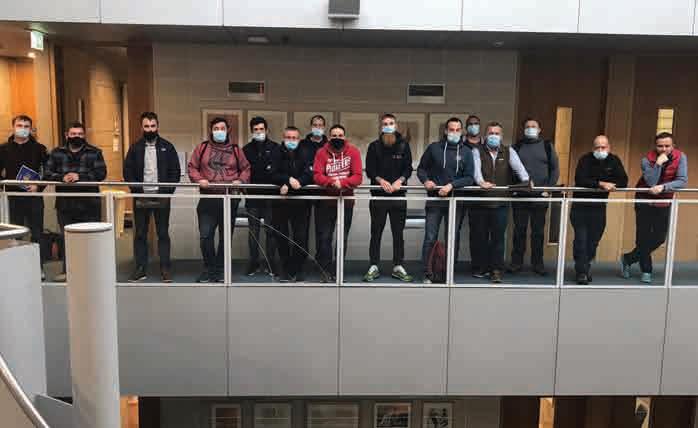
Under this scheme, participants pay 10% of the programme fees, which is €510.
The retention of participants has also been a strong point, with a 95% completion rate to-date.
The ongoing demand for qualified Construction Managers, coupled with increasing investment in lifelong learning opportunities bodes well for the future of this programme.
Entry requirements
Applicants who have completed a minimum full NFQ Level 6 programme in Construction Management or in a cognate area of study will be eligible for entry to the programme.
Applicants who have a senior trades apprenticeship qualification in plumbing, electrical, carpentry, brick and stone laying, electrical instrumentation, electronic security systems, instrumentation, industrial electrical engineering, manufacturing
engineering, manufacturing technology, mechanical automation, pipefitting with a minimum of 2 years relevant experience will be eligible for entry to the programme.
Entry to the programme may also be allowed via the Institute’s Recognition of Prior Learning (RPL) process on an individual case-by-case basis.
This RPL process includes the matching of the candidate’s prior learning (education and experiential) with the equivalent Level 6 programme outcomes.
Please contact Brian Graham for further details on this programme (bgraham@wit.ie) https://www.wit.ie/courses/bsc-inconstruction-site-management
BSc (Hons) in Construction Management
The BSc (Hons) in Construction Management is a part-time NFQ Level 8 qualification specifically aimed at those currently working in a Site Management role who aspire to progress to a Project Management position.
Launched in September 2021, the programme builds upon the the recent
the programme places the role of the modern Construction Manager within the discipline of project management and the broader context of the construction industry and society in general. The primary objectives of the programme are:
1. Advance the professional development of learners in terms of innovation, problem-solving and advanced personal and interpersonal skills for the role of Project Management.
2. Develop key management and leadership skills related to managing people, subcontractors, schedules, budgets and client representatives on complex construction projects.
There is a strong focus upon the development of advanced project management skills, innovation and problem-solving, personal and professional development, advanced information technology skills (including scheduling software and BIM) and applied action research in the form of a Dissertation, based on problem(s) identified at work.
The incorporation of participant’s prior industry experience features prominently across all modules,
success of the BSc in Construction Site Management and the wellestablished MSc in Construction Project, providing a clearly defined progression pathway from Level 7 to 9 for busy construction professionals who wish to engage in lifelong learning via flexible blended delivery.
With an increasing need for adaptability, flexibility and ability to cope with change in the workplace,
particularly through the two practicebased modules, Professional Practice and Construction Management Practice.
Entry requirements
Applicants are required to hold a NFQ Level 7 degree in Construction Management or in a cognate discipline of study in the built environment. Cognate disciplines include Construction Site Management,
ABOVE:
Spring/Summer 2022 | Construction Management | 37
Level 8 CM students
Construction Studies, Civil Engineering, Quantity Surveying, Architecture, and Architectural Technology.
Graduates of other disciplines, with construction experience, may be considered under the Institute’s RPL Policy.
Please contact Brian Graham for further details on this programme (bgraham@wit.ie). https://www.wit.ie/ courses/bsc-hons-inconstruction-management
MSc in Construction Project Management
The Master of Science in Construction Project Management is a NFQ Level 9 postgraduate programme which was launched by WIT in 2005.
This course provides a range of knowledge and skills that are applicable to successful project management including subjects such as programming & scheduling, economics, finance, contracts & procurement, digital construction, human resource management, law, sustainability, Lean construction and professional development.
This programme can be undertaken in full-time and part-time modes.
Full-time mode consists of 6 modules per semester and completion of the research dissertation over a twelve-month period.
Part-time mode consists of 3 modules per semester and completion of the research dissertation over a twenty-four-month period.
The key aim is to develop the participants' ability to identify, assess and resolve the issues that impact on successful project management. The primary objectives of the programme are: 1. Develop a deep understanding of and
competence in the key project management processes in a construction environment.
2. Develop the participants’ research knowledge and capabilities, thus enabling their application to the management of projects, innovation and continuous improvement in the construction industry.
Completing this programme and gaining the MSc qualification should enable the successful participants to perform at a higher level in the Irish and international construction industry and generally enhance their overall career prospects.

Many graduates of the programme now work in senior management positions with some of Ireland’s leading contractors, consultants, clients and developers.
Entry requirements
The normal minimum expected entry requirement for the MSc in Construction Project Management will be a cognate accredited NFQ Level 8 Honours 2.2. Engineering or Science degree.
Entry to the programmes may also be allowed via the Institute’s Recognition of Prior Learning (RPL) process on an individual case-by-case basis.
This robust RPL process demonstrates that the candidate’s prior learning (education and experiential) has achieved outcomes commensurate with accredited Level 8 programme outcomes.
Please contact Anne Marie O’Connor for further details on this programme (amoconnor@wit.ie). https://www.wit.ie/ courses/msc_in_ construction_project_ management_part_time
MScCPM Site Visit to Waterford Courthouse PPP Project
TRAINING & CAREERS 38 | Construction Management | Spring/Summer 2022
Design + Construct Centre!
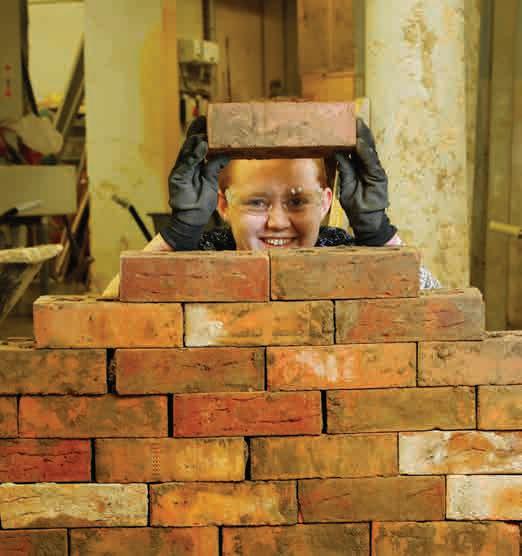

TU Dublin and Chadwicks have partnered to meet the national demand for skills training and more!
See page 52, this issue.
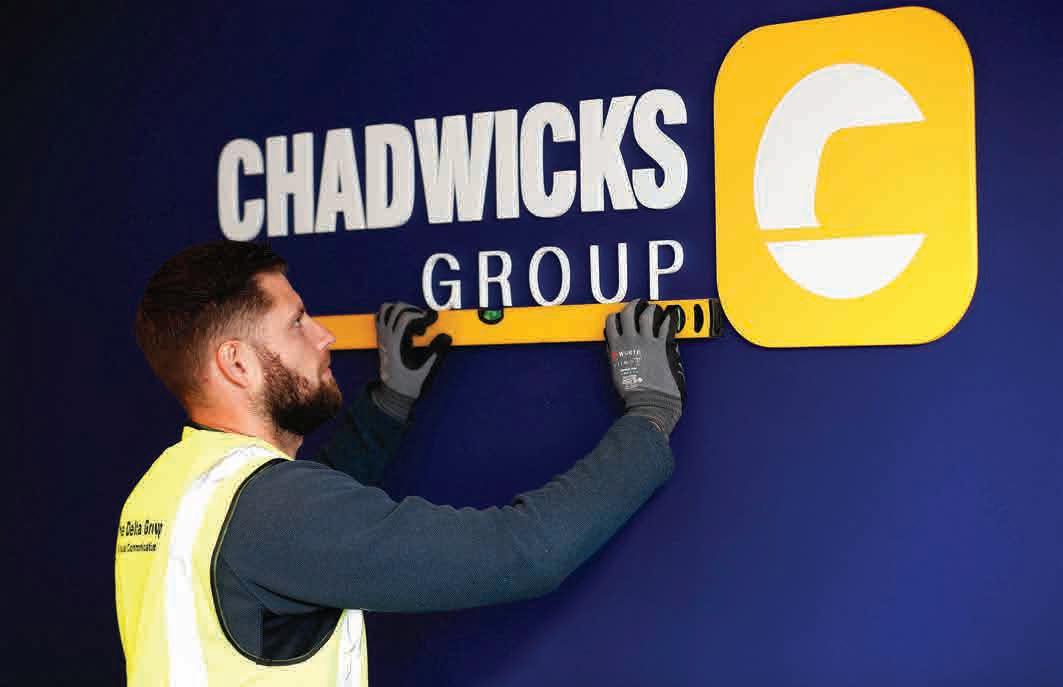
Spring/Summer 2022 | Construction Management | 39
A partnership between enterprise, industry, education, training, and government, WorldSkills Ireland is returning to the RDS Simmonscourt, Dublin, from 13 – 15 September 2022.
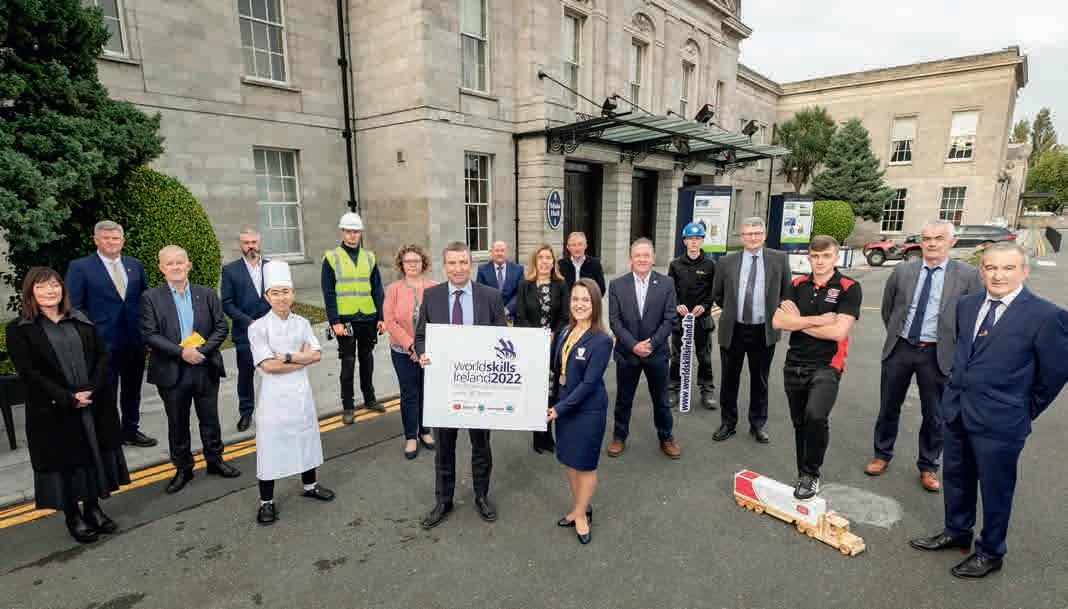
Building a skilled future: WorldSkills Ireland returns
Following the incredible success of 2019’s WorldSkills Ireland when 12,000 people visited the three-day event, it is now set to return.
It will be a live celebration of apprenticeships, skills and careers to inspire young people from across the country.
Supported by industry partners, SISK, Designer Group, Construction Industry Federation, ESB Networks and Autodesk, and Education Partners including The Department of Further and Higher Education, Research, Innovation and Science (DFHERIS), The Higher Education Authority (HEA), SOLAS and NAO.
WorldSkills Ireland 2022 has been designed to raise the profile and recognition of skills and
apprenticeships, preparing the talent of today for the careers of the future.
Unique Ray English, WorldSkills Ireland-chair/ technical delegate adds: ‘What makes WorldSkills Ireland so unique is the support of government, industry and education.
‘This combined effort demonstrates how important skills are to our economy now, and in the future, in terms of addressing the skills shortage, and showing our young people, and their parents, the wealth and quality of apprenticeships and learning opportunities that are on offer.’
All event partners are in agreement that skills drive the future.
WorldSkills Ireland is designed to
inspire young people through its twenty-five live national competitions, to participate in the ‘Try-A-Skill’ area, to be encouraged by industry experts on the Heroes Stage, to meet employers who are ready to recruit and to view cutting-edge digital tech skills that are the backbone of jobs of the future.
Discussion
During a recent panel discussion on the importance of WorldSkills Ireland, Joanne Cluxton, vice chair of the CIF Education, Training & Skills Committee, CIF said:
‘WorldSkills Ireland showcases careers across the construction industry. In the next decade, there’s going to be almost 30,000 jobs
40 | Construction Management | Spring/Summer 2022
TRAINING & CAREERS
available in construction and students who attend the event can see the skills in action and opportunities that are available.’

Says Amanda Fennell, director of EMEA Marketing, Autodesk: ‘One of the most important things about the event is that, in just a few hours, school leavers have the unique opportunity to meet with employers from so many sectors all under one roof.
‘It’s like speed dating for careers and facilitates direct access to employers to discuss careers and the roles available, what skills are required and future earning potential.’
Forensic Analysis, Creative Digital Media, Software Design for Mobile Apps and Connected Devices and Robotics and Automated System.
Commenting on her journey, competing at WorldSkills Ireland in 2019, Megan Yeates, a Gold Medal winner in Freight Forwarding, comments:
‘2019 was an amazing event to be at and an incredible opportunity. I got to apply all of my skills and knowledge that I had learnt to date and put them into practice.
‘My brother and his school friends loved the day out, seeing all of the skills, and the event opened their minds to opportunities and jobs that they wouldn’t have considered otherwise.
‘Following my brother’s visit to WorldSkills Ireland, he actually chose to go down an apprenticeship route which he’s thoroughly enjoying,’ said Megan.

In the recent panel discussion on the event, another element that all panellists discussed is the variety of roles within the various sectors, how the roles are evolving and how transferrable skills are across industry.
From problem solving and analytical skills to the digitalisation that’s taking place across all industries, WorldSkills Ireland will open school leavers’ minds, correcting some of the more traditional stereotypes associated with certain sectors and educating young people on career options and progression.
Panel
Options
Highlighting the vast array of options in higher education, just some of the specialisms set to be featured at WorldSkills Ireland are Game Design, Landscape Architecture, Sustainable Energy Engineering, DNA and
‘I got a chance to go up against the best of the best in Ireland, and winning gold, enabled me to represent Ireland at WorldSkills in Kazan. It opened so many doors to my career.’
Impact
Megan also spoke about her younger brother’s visit to the 2019 event with his school, and the positive impact it had on him and his school friends.
Signing off the panel discussion, Donal Keys. head of skills – School of Mechanical & Design Engineering at Technological University Dublin concluded:
‘WorldSkills Ireland is the “go to” event for skills education and training in Ireland and showcases the full spectrum of career paths.
Celebrating Ireland’s rich skills heritage, WorldSkills Ireland is a onestop-shop to see and partake in skills of the future, and for young people, it’s an invaluable learning experience that can have a lasting impact on young people’s futures.’
WorldSkills Ireland is set to inspire the next generation of skilled young people to follow their passions, interests and talents.
Information
For further information on WorldSkills Live, please see www.worldskillsireland.ie or follow WorldSkills Ireland on social media.
Register to visit now at www. worldskillsireland.ie | Opening hours are from 10:00 – 17:00 and group time slots will be allocated from 10:00 – 12:00 or from 13:00 – 15:00. Attendance is free.
Should you have any questions on the event please contact the Live Team on 01 8460020 or email info@eventhaus.ie
‘ALL EVENT PARTNERS ARE IN AGREEMENT THAT SKILLS DRIVE THE FUTURE.’
Spring/Summer 2022 | Construction Management | 41
Study a diploma in Construction Law with the Law Society of Ireland
The award-winning Diploma Centre at the Law Society of Ireland offers an in-depth Diploma in Construction Law, which begins on 8 October 2022.

Overview
The course, open to suitably qualified professionals and lawyers, provides an overview of the specialised discipline that is construction law and practice in Ireland.
Claire O’Mahony, head of the Diploma Centre, says for over twenty years the Diploma Centre has provided continuing professional education and training in Ireland.
‘Our primary aim is to offer high-quality, postgraduate courses with an emphasis on efficient and flexible course delivery and welcoming customer service.
‘We provide a flexible approach to learning, and courses are delivered by experienced practitioners and industry leaders.
Delighted
‘We are delighted to have had our diploma course recognised by the industry by being nominated in the “Best Third Level Course – CPD” category at the 2022 Irish Construction Excellence Awards.’
Now in its seventh year, this diploma will take a practical approach to the complex issues that arise from the multiparty nature of the construction process.
Participants will be introduced to the standard forms of construction contracts, with particular focus on the public works and RIAI contracts.
Prominent areas
Other prominent areas
of study include the Construction Contracts Act 2013, allocation of risk between the employer and the contractor, collateral warranties and bonds, specialists and subcontractors, and the Building Control Regulations 1997 - 2021.
2022 modules: Module 1: An introduction to Construction Law Module 2: Construction procurement – the tendering process Module 3: Construction contracts Module 4: Construction dispute resolution
On completion of this training programme, participants will be able to:
communicate to a range management stakeholders, demonstrating in-
contracts and the contract law and tort in the construction process
including health and control legislation
report on the implications a contract is discharged dispute resolution mechanisms (such as adjudication and
clients on the merits
different mechanisms.
Who should apply?
This course is suitable for construction professionals, including engineers, claims surveyors, and expert witnesses, as well as solicitors or barristers currently working in the area or those who would be interested in practising in this area.
For further information visit www.lawsociety.ie/ diplomacentre or contact the
Diploma Team: diplomateam@lawsociety. ie | 01 672 4802.
‘As a civil engineer working in higher education, the diploma programme was a great opportunity for further professional development. The course covers a wide range of topics relevant to construction professionals.
‘I found the course activities and construction law lecturers very engaging. Other learners on the course came from both legal and construction backgrounds, so the workshops and group assignments were a great way to share practice and learn from each other.
‘The Diploma Hub was a great resource for reviewing lectures and accessing reading materials, and the technical support from the course administrators was excellent. I would recommend the Diploma in Construction Law to others.’
Eleanor Diver, Lecturer, Atlantic Technological University
‘A great opportunity for further professional development’
LAW SOCIETY 42 | Construction Management | Spring/Summer 2022
Everstruggled for hours to solve a problem, only to have someone walk over and, after a quick glance, point out what you instantly recognize as an obvious solution?
It's frustrating. It's embarrassing. It always makes me feel pretty stupid.
Yet it shouldn't. The issue isn't necessarily a lack of intelligence. And definitely not effort. The problem isn't how I'm looking.
The problem is where
Study
In a study published in Cognition, researchers gave expert chess players game problems to solve and then tracked their eye movement as they sought a solution.
Once the experts found a possible solution, their eyes kept drifting back to it – even though they claimed to be searching for better options.
That natural tendency is called the Einstellung effect: when the first idea that comes to mind, triggered by familiar features of a problem, prevents a better solution from being found.
Solution path
If I think a production problem is due to a familiar bottleneck, that's the solution path I'll explore.
If I think a program flaw is due to a certain block of code – especially if something similar has happened in the past – that's the solution path I'll explore.
If I think an underperforming employee is struggling – like many of his peers –because of a lack of motivation, that's the solution path I'll explore.
As the researchers write: But their eye movements showed that they continued to look at features of the problem related to the solution they had already thought of. The mechanism which allows the first schema activated by familiar aspects of a problem to control the subsequent direction of attention may contribute to a wide range of biases both in everyday and expert thought – from confirmation bias in hypothesis testing to the tendency of scientists to ignore results that do not fit their favoured theories.
Vision tunnels
Or in non-researcher-speak, when I think I
Eliminating the familiar can instantly reveal a broader array of potential solutions, writes Jeff Haden.
know the answer, my vision tunnels. I'm a hammer, so the problem is surely a nail.

And anything that appears to confirm that the problem is a nail makes me not only more likely to follow that path, but also to feel good about following that path.
In the book Denying to the Grave: Why We Ignore the Facts That Will Save Us, Jack and Sara Gorman describe research that suggests we get a rush of dopamine – the neurotransmitter that makes us feel good – when we find information that supports a belief.
So how can you avoid the Einstellung effect?
With the chess masters, the researchers simply removed the possibility of the familiar (yet slower and less effective) solution.
When that happened, the players' gaze
immediately shifted to areas of the board crucial to the better solution.
You can do the same. If you're looking for the best solution, pretend the first answer you came up with isn't available.
Pretend you can't solve the problem that way. You can't eliminate that bottleneck. You can't revise that block of code. You can't try to motivate a struggling employee.
Maybe
But maybe you can provide more training. Or assign a mentor. Or create targets more in line with his or her interests. Or shift to a hybrid work schedule.
Taking one solution off the table, at least for the moment, can help you look at difficult problems in entirely new ways.
And discover solutions that, once found, seem obvious.
Want to be more innovative and creative? Science says avoid the dreaded Einstellung effect!
Spring /Summer 2022 | Construction Management | 43 ‘WHEN I THINK I KNOW THE ANSWER, MY VISION TUNNELS.’
PERSONAL & FINANCE
Always a highlight for us here at CMi is the Concrete Society Awards. As usual the event –along with the entries and eventual winners – was full of inspiration and innovation!
SKATE BOWL AND PLAZA WINS 39TH IRISH CONCRETE SOCIETY AWARD
Excellence in concrete design and construction was celebrated at the Irish Concrete Society’s Awards Evening, which took place in the Clayton Hotel, Burlington Road, Dublin.

This was the 39th Annual Awards Evening.
The event is always one of the highlights of the construction industry’s calendar, and returned after a 3-year absence with 280 in attendance.
The Awards recognise excellence in both design and construction in concrete and are adjudicated by a distinguished, independent jury of industry professionals.
Reviewed
The main awards jury reviewed a total of thirty-two projects nominated in three categories of main awards - Element, Infrastructure and Building.
There were also nine projects nominated for the 9th International Award, which is sponsored by Enterprise Ireland.
In addition, the winner of the annual Sean de Courcy Student Award was announced.
Speaking at the awards evening, Chair, Roger West stated: ‘Tonight is one for celebrating, celebrating the "promotion of excellence in the use of concrete" in all its forms.
THE MAIN AWARDS
‘The creativity and skill of the various parties in each and every one of our entries for awards tonight must be in synergy to be successful in winning one of our main award categories.
Expertise
‘No less deserving of our admiration a re those companies that export our expertise and our products, as flagships of our industry’s recognised excellence on an international stage, while concurrently supporting the local economy.
‘This is reflected in the increasing importance of winning the International Award’.
The main awards jury consisted of Eddie Cleary (Duggan Brothers (Contractors) Ltd.), Grace Keeley (GKMP Architects), and Richard Osborne (Waterman Moylan).
Element Category and Overall Winner: Skate Bowl and Plaza at Le Fanu, Ballyfermot, Dublin. Chosen from a total of 13 element category entries and 32 entries for the overall award.
Jury Quote: ‘This community-led project, borne out of an international design competition has been carefully designed and executed almost entirely in concrete to provide a fantastic amenity to the youth of Ballyfermot.

‘An extensive public consultation process has resulted in a park that caters for a range of users of varying ability from BMX cyclists to scooter users and skateboarders.
‘The Design Team and the contractors on site have worked together to overcome construction constraints and deliver a challenging sculptural design achieving a 2mm tolerance throughout.
‘The jury was extremely impressed by the smoothness of concrete surface achieved across the three dimensional skate-BMX plaza, skate bowls and skate transition area, a critical requirement of a skate park brief.
‘This is a project of complex depressions, protrusions and undulations that demonstrates the careful use of in-situ concrete to create a highly successful amenity of which the community is justifiably proud.’
Project Client: Dublin City Council
Project Architect: Relational Urbanism
Project Engineer: Robert Barry Consulting Engineers
Project Contractor: C&A Build & Civil
Major Suppliers: Roadstone
44 | Construction Management | Spring/Summer 2022
CONCRETE AWARDS
Infrastructure Category Winner: Rose Fitzgerald Kennedy Bridge, Co. Wexford. Chosen from a total of 5 projects entered.
Jury Quote: ‘The Rose Fitzgerald Kennedy Bridge, Ireland’s longest bridge at 887m in length, pushes the boundaries of bridge engineering and concrete technology and is a testament to the engineering skills and expertise of the Design Team and contractors.
‘This new dramatic crossing over the River Barrow not only

greatly improves connectivity in the South-East region but also allows for the rejuvenation of the nearby town of New Ross.’
Project Client: Transport Infrastructure Ireland / BAM PPP & Iridium
Project Engineers: Arup / Carlos Fernandez Casado S.L
Project Contractor: BAM Ireland in Joint Venture with Dragados
Major Suppliers: Banagher Precast Concrete / Roadstone
Building Category winner:
UCC Student Hub, University College Cork. Chosen from a total of 14 entries
Jury Quote: ‘The new Student Hub incorporates and ref urbishes the 1850s Windle Building in the heart of the historic campus of UCC.

‘A thickened wall of cellular rooms bends around the back of the original structure, enclosing an open hall for student activity.
‘The jury was particularly impressed by the colour, consistency and quality of finish of the insitu concrete elements throughout the entrance and central Market Hall. Reception desk, bench, stairs, bridges and balconies are carefully formed in concrete and together with a richly textured red brick paved floor and painted steel elements create a dynamic space for student gatherings and public meetings’.
Project Client: University College Cork
Project Architect: O'Donnell + Tuomey
Project Engineer: Horgan Lynch Consulting Engineers
Project Contractor: JJ Rhatigan / DPPS Contracts
Major Suppliers: Kilsaran
Spring /Summer 2022 | Construction Management | 45
CONCRETE AWARDS
This award, sponsored by Enterprise Ireland, recognises Irish companies who export product or service off the island of Ireland.
The Award reflects the continued emphasis on export for Irish construction. The Jury included Chair Ed Hanlon (Engineer), David Clarke (Moloney O’Beirne Architects), and Donal Byrne (Enterprise Ireland).
Chosen from a total of 5 entries.
Jury Quote: ‘The Judges were impressed with the quality of all the entries for this year’s Irish Concrete Society International Awards and consequently judging was difficult
with a few projects scoring very highly.
‘However, there can only be one winner and the judges were unanimous in their choice; based on the complexity of the units used with interlocking panel geometry plus the high quality of finish the jury has selected the Paul Marshall Building, at the London School of Economics as this year’s International Concrete Award Winner.
impressive. Sustainability was introduced to the judging criteria this year.
‘The commitment from Manufacturers to meet the current market demands for attention to sustainability is essential, and we join with our winner in celebrating the achievement of all the entrants for their success in winning prestigious overseas projects.’
Sean de Courcy Student Award
This is an annual award given to the best final year project on a concrete related topic from the engineering faculties of Higher Education Institutes.
The award is named after the late Professor Sean de Courcy, an inspirational professor for many years at UCD, a former chairperson of the Irish Concrete Society, an author and historian of note.
The student award jury was made up of Robert Laird (ESB), Cloragh Byrne (Arup), and Martin O'Meara (CSEA).
‘The creative and innovative approach to overcoming challenging joint details required to present a strong visual feature which defines the façade of this iconic London University Building was most Highly Commended: Jagoda Lipczynska (Trinity College Dublin)
Project Title: Composite behaviour of wide sandwich panels with high performance concrete thin wythes with and without Thermomass shear connectors
Winner: Aaron Lowe (Dublin Technological University)
Project title: Simulating hydration of cement using PHREEQC
Project Client: Paul Marshall Building, L ondon School of Economics

Irish Export Companies: Techrete and Grafton Architects
About the Irish Concrete Society
The Irish Concrete Society is a learned society founded in 1973 to support and encourage technical excellence in concrete.
It is a cross-sectorial, independent, impartial, science based organisation. With membership open to all who have an interest in concrete.
The Society acts as a focal point for industry debate, research, education, standards development in the field of concrete technology, design and construction.
The Society is a not for profit organisation funded by membership subscriptions and the services it offers.
Winner of the 9th International Award Techrete and Grafton Architects for ‘Paul Marshall Building, London School of Economics’
46 | Construction Management | Spring/Summer 2022
CONCRETE AWARDS

The Atlantic Technological University (Ollscoil Teichneolaíochta an Atlantaigh) was this April launched by the Minister for Further and Higher Education, Research, Innovation and Science, Simon Harris. Minister Harris said the new university would play a pivotal role in the strategic regional development of the west and north-west.
Further and Higher Education minister Simon Harris hailed the launch of the new Atlantic Technological University (ATU) as ‘a landmark day’ – and predicted the new body would become a ‘powerhouse’ in the region.
Formation
The formation of ATU creates university campuses in counties Donegal, Sligo, and Mayo for the first time while giving Galway city a second university option.
It also offers students in surrounding counties the option of a TU education.
ATU will serve 21,000 students and be one of the largest multi-campus universities in Ireland with 8 campuses, research centres and iHubs.
The university will be supported by 2,250 staff, delivering practice-oriented study and research.
Some 600-plus higher educational programmes will be available at all
Atlantic Technological University receives wide welcome

levels of the National Framework of Qualifications from apprenticeships to doctoral level qualifications.
It is expected that ATU’s unified approach and ground-breaking research in diverse areas will belie its position at the edge of Europe and move it to the centre of the global stage.
Status
Technological University status was last year granted to a consortium comprising Galway-Mayo, Sligo and Letterkenny Institutes of Technology.
Earlier this year, Minister Harris designated Dr Orla Flynn as the first President of ATU. Dr Flynn was previously
President of Galway-Mayo Institute of Technology.
In his remarks – made at ATU Sligo, Simon Harris, said:
‘The establishment of Atlantic Technological University, the fourth TU in the State, is a significant occasion for higher education in Ireland and in particular for the West and North West regions.
‘I know today is a day of mixed emotions as we dissolve GMIT, IT Sligo and Letterkenny IT but it should be a day of immense pride too to the management, governing authorities and staff of the three institutions.
‘Today is the start of a new journey.
‘TECHNOLOGICAL UNIVERSITY STATUS WAS LAST YEAR GRANTED TO A CONSORTIUM COMPRISING GALWAY-MAYO, SLIGO AND LETTERKENNY INSTITUTES OF TECHNOLOGY.’
48 | Construction Management | Spring/Summer 2022
ATU
ABOVE: L to R: Newly appointed President of Atlantic Technological University, Dr Orla Flynn and initial Governing Body members Oonagh Monahan, founder and managing director of Alpha Omega Consultants Ltd; Maura McNally SC, inaugural Cahair of ATU; Felim McNeela, founder of Avenue Mould Solutions; Anne McHugh, chief executive of Donegal ETB.
Governing body of new Atlantic Technological University convened
History was made when the Governing Body of the new Atlantic Technological University (Ollscoil Teichneolaíochta an Atlantaigh) convened for the first time at ATU Donegal, Letterkenny and appointed Dr Orla Flynn as its first President.
Landmark
The landmark inaugural meeting, chaired by ATU chair Maura McNally SC, followed the granting last year of technological university (TU) status to a consortium comprising Galway-Mayo, Sligo and Letterkenny Institutes of Technology.
The initial Governing body members are: Chair Ms Maura McNally SC, Chair of the Bar Council of Ireland
Consultants Ltd
Mould Solutions ATU was officially opened on Monday 4 April by Minister for Further and Higher Education, Research, Innovation and Science, Simon Harris at an event in ATU Sligo.
Campuses
It creates university campuses in counties Donegal, Sligo, Galway and Mayo for the first time while giving Galway city a second university option. It also offers students in surrounding counties the option of a TU education.

New Atlantic Technological University will deliver €700m to Ireland’s economy per year
New research from the Northern and Western Regional Assembly (NWRA) has confirmed the major contribution that the new Atlantic Technological University (ATU) will make to Ireland’s economy, with the university expected to contribute €700m in economic output and support just over 3,100 jobs per year.
Impact
Such an economic impact represents an improvement on previous estimates, in terms of operating expenditure and staff wages.
It is also expected that the value of the new TU to the economy will rise significantly in the coming years.
said: ‘The designation of the Atlantic TU represents far more than a name change.
‘It will support the recovery of the Northern and Western region’s economy, by improving productivity levels, expanding the region’s ability to develop innovative products and services and supporting the creation of high-value jobs.
‘The designation will also deliver much wider benefits to the region.
Together these institutions will merge to become ATU - a powerhouse working for the region, for investment in the region and its people.
‘Both Orla Flynn as president of the new TU, and Maura McNally as chair of the Governing Body bring exceptional experience to the roles.’
Beginning
Said ATU President Dr Flynn: ‘Today is the beginning of an exciting journey for our entire Atlantic Technological University community, and I am looking forward to the challenge of bringing us together as one University to serve the needs of our unique region.’
The NWRA has found that every €1 of expenditure by the new Atlantic TU is likely to result in an overall increase of nearly €4 in output to the Irish economy, highlighting how future investment in the university represents value for money to the exchequer.
Furthermore, the Atlantic TU will contribute to around 3% of the region’s economy while just under 10% of third-level students in Ireland will be in enrolled in the Atlantic TU, highlighting the importance of the TU to delivering balanced regional development in Ireland.
Support
Commenting, John Daly, economist at the NWRA and author of the research,
‘For example, the new TU will improve the quality of third-level teaching in the Northern and Western region of Ireland, as the Atlantic TU will be required by legislation to ensure that at least 90% of full-time academic staff hold a Level 9 Qualification or higher.
Required
‘Likewise, at least 45% of full-time academic staff will be legally required to hold a Level 10 Qualification or the equivalence in professional experience, with the university required to increase this ratio from 45% to 65% in ten years.
‘The new TU will also enhance the region’s skills base – as the new university will have to ensure that at least 4% of full-time students are awarded a master’s degree – while such a designation will improve the ability of the Northern & Western region to attract private and public research funding through economies of scale and collaboration.’
Spring/Summer 2022 | Construction Management | 49
Ireland – Today & 2030’, report.
Actions
Several actions are needed to tackle these embodied emissions.
First and foremost, as what is not measured cannot be improved, a detailed timeline for mandating whole life carbon assessment must be published.
This should be followed by the introduction of limits per square metres for various building typologies in the next 10 years.
Several countries, such as the Netherlands, the Nordics and France have already regulated whole life carbon in the built environment.
The latest IPCC’s report (at time of writing) highlighted once again the urgency of decarbonising our economy to remain below 1.5C warming.
This requires all economic sectors to transition to net zero carbon emissions as soon as possible and is particularly critical for carbon intensive industries, such as construction and the built environment.
The initial findings of a report on ‘Whole life carbon in construction and the built environment in Ireland’ published by the Building in a Climate Emergency (BIACE) Research Lab at UCD indicates that our sector accounts for 37% of Ireland’s emissions, the same as agriculture.
As I write this article, the Irish Green Building Council (IGBC) is working in close cooperation with key stakeholders to develop a roadmap to decarbonise Ireland’s built environment across its whole life cycle.

It will be open for public consultation till Tuesday, 7 July.
This article presents some of the recommendations included in the draft document.
Addressing embodied carbon emissions is critical and urgent
Of the 37% of Ireland’s greenhouse gas emissions associated with construction and the built environment, 23% relate to heating, lighting, and cooling our buildings (operational carbon), with the remaining 14% being accounted for by embodied carbon.
These emissions result from
ABOVE: Pat Barry, IGBC
mining, quarrying, transporting, and manufacturing building materials, in addition to constructing buildings.
The introduction of the NZEB standard and ambitious retrofit targets should lead to significant reduction in operational carbon emissions over the next decade.
However, with 500,000 homes to be built by 2040 and significant infrastructure projects, embodied emissions will grow significantly if we don’t change the way we build – not to mention where we build, and the impact of planning on transport emissions.
In brief, our sector cannot halve its emissions 2030 as required under the ‘Climate Action and Low Carbon Development (Amendment) Act 2021’ if embodied carbon emissions are not addressed in the next few years.
This is one of the key findings of the ‘Whole Life Carbon in Construction and the Built Environment in
Recent European policies and legislation, such as the EU taxonomy and the proposed revision of the Energy Performance of Buildings Directive show that Europe is also moving in that direction.
Given the public sector must lead by example in our transition to net zero carbon buildings, whole life carbon assessment could first be mandated for publicly funded projects.
This, and the wider use of innovative procurement approaches, would support the development of an indigenous low carbon product sector – including biobased products, services, and supply chain.
Energy renovation and reuse must be at the centre of the transition
With energy prices at record highs, supporting energy renovation is critical.
The recent launch of the national retrofit scheme, which for the first time includes multi-annual budgets, is highly welcomed.
It should provide the industry with the certainty it needs to invest in skills and upscale, but more must be done to make energy renovation more accessible, affordable, and desirable.
The draft roadmap includes several recommendations to support energy renovation.
These include a call for the launch of a register of independent energy renovation advisors, as well as for the introduction of buildings’ digital logbooks and renovation passports.
A Building Renovation Passport is a masterplan for the retrofit of a building.
It supports staged renovation by providing building owners
IGBC updates – all the latest from the Irish Green Building Council
As usual we check in with the Irish Green Building Council to get the latest. This time out we find they are busy as ever!
50 | Construction Management | Spring/Summer 2022
GREEN BUILDING
with a clear plan to improve their building over several years.
If implemented at scale, building renovation passports and digital logbooks can support projects aggregation, hence reducing costs.
Finally, as the greenest building is often the one already built, everything must be done to ensure buildings remain in use.
With 90,000 vacant properties across the country, streamlining building regulations, and aligning all relevant policies, and financial incentives to make adaptation and reuse of existing buildings easier is urgent to reduce whole life carbon emissions.
On the importance of developing and refining tools and guidelines
Besides the introduction of building renovation passports and digital logbooks, several tools and guidance documents must be developed or refined to support the decarbonisation of the built environment.
First, a database with generic information on the carbon impact of construction products used in Ireland must be developed.
The development of product specific Environmental Product Declarations (EPDs) must also be encouraged.
Finally, the methodology to assess whole life carbon in the built environment must be further refined.
This should be aligned with Level(s), the European Framework for sustainable buildings, to ensure its fully compatible with regulatory developments at EU level.
As we cannot reach carbon neutrality without transitioning to a fully circular built environment, tools such as building material passports and exchange platforms to support reuse and recycle must be developed and mainstreamed.

Guidance documents on the reuse of construction products, demolition, buildings’ reuse, and adaptability are also needed.
Ensuring we have the right skills
The lack of skills at all levels of the supply chain and labour shortages could jeopardise the decarbonisation of Ireland’s built environment.
The number of energy efficiency training courses for building professionals and construction
workers have increased significantly over the years.
To facilitate upskilling, these must remain free or offered at a low cost. They must also be delivered online, onsite or in a blended format.
As this may not be enough to deliver upskilling at scale, the opportunity of introducing a “sustainability pass” (similar to the “safe pass”) or to use public procurement to incentivise upskilling should be explored.
Training courses on how to address whole life carbon and to support a more circular industry must also be developed for building professionals and construction workers, as well as training courses to improve the carbon literacy of procurers and of the finance industry.
Campaigns are also required to attract more people to the sector, and we must ensure people completing construction degrees and apprenticeships have the right set of skills when entering the industry.
Conclusion
As highlighted in this article, halving Ireland’s built environment and construction industry emissions by 2030 require bold actions, innovation and perhaps, more importantly collaboration.
The draft roadmap launched at the Build Green Now conference aims at presenting concrete solutions, which can be implemented now.
At this critical juncture in time, we would like to encourage everyone in the industry to get involved in the development of the roadmap and in its implementation.
About #BuildingLife
The draft roadmap to decarbonise Ireland’s construction industry and built environment has been developed as part of the #BuildingLife campaign.

The aim of the campaign is to achieve the mix of private sector action and public policy necessary to tackle the whole-life environmental impact of buildings.
Developed
The campaign is funded by the IKEA and Laudes Foundations. Similar roadmaps are being developed in seven other European countries and at EU level.
Further information on the draft roadmap, the “Whole Life Carbon in Construction and the Built Environment in Ireland – Today & 2030” and the public consultation is available at www.igbc.ie.
The public consultation will be closing on Tuesday, 7th July. Further information on the draft roadmap, the “Whole Life Carbon in Construction and the Built Environment in Ireland – Today & 2030” and the public consultation is available at www.igbc.ie
The public consultation will be closing on Tuesday, 7th July.
Spring/Summer 2022 | Construction Management | 51
TU Dublin and Chadwicks partnered recently to meet the national demand for skills training, education and craft apprenticeship for the Architecture, Engineering and Construction (AEC) sectors.

Chadwicks
Group recently announced a partnership with Technological University Dublin (TU Dublin) to develop Ireland’s first Design + Construct Centre.
Support
As part of the partnership, Chadwicks Group is donating €250,000 to support the construction of the new state-ofthe-art centre which will redefine and revolutionise the teaching and learning of Architecture, Engineering and Construction (AEC) in Ireland.
Once complete, Design + Construct Centre, which will be located at Broombridge close to the University’s Grangegorman Campus, will enable TU Dublin to meet future national AEC education needs while also contributing to global green and digital construction targets.
It will produce highly skilled, workready graduates and apprentices who have developed through knowledge sharing, research, and access to cutting edge physical and virtual resources.
Delighted
Commenting on the announcement, Patrick Atkinson, chief executive of Chadwicks Group said:
‘Chadwicks Group is delighted to announce it is partnering with TU Dublin to develop a new state-of-the-art centre for students of the Architecture, Engineering and Construction field.
‘Training and development are of the utmost importance for our industry at present.
‘This partnership will assist TU Dublin to meet the national demand for skills training, education and
Chadwicks Group donates €250,000 to TU Dublin to develop Ireland’s First Design + Construct Centre
craft apprenticeship by focusing on upskilling and reskilling students through flexible, practice-based learning.
‘The new centre will play a key role in addressing our nation’s skills gap in key sectors by providing a much-needed space for dynamic learning and we are
thrilled to mark the beginning of this partnership.’
Experts
Educational and learning activities at the Design + Construct Centre will be led by national and international experts and students will be supported
52 | Construction Management | Spring/Summer 2022
SPOTLIGHT ON: CHADWICKS/TU DUBLIN
in developing their sustainable entrepreneurial and business skills.

The centre will offer a flexible learning environment to reflect the dynamics of modern construction and sustainable practices, including:
libraries and training spaces
Building Information Modelling, Artificial Reality, Virtual Reality and Mixed Reality
fabrication facilities
Through technology and innovations in construction and design, the centre will also contribute to global sustainability and digital construction targets.
Impact
Orna Hanly, Design + Construct Project Lead at TU Dublin, commented on the impact of the new partnership:
‘TU Dublin is delighted to welcome the Chadwicks Group to a tightly connected network of industry and academic partners, collaborating to hasten the digital transformation of the sector and set new international standards of

practice in support of climate action.
‘The Chadwicks Group’s generous support of Design + Construct will deliver a seamless network of learning and research for the Architecture, Engineering and Construction industry, developing graduates with the capabilities required to lead a climate-focused digital revolution in the sector.’
 ABOVE: At the partnership announcement between Chadwicks and TU Dublin: CEO of Chadwicks Group, Patrick Atkinson; Design and Construct Project Lead at TU Dublin, Orna Hanly, and some Access to Apprenticeship students. Photos by Leon Farrell/Photocall Ireland
ABOVE: At the partnership announcement between Chadwicks and TU Dublin: CEO of Chadwicks Group, Patrick Atkinson; Design and Construct Project Lead at TU Dublin, Orna Hanly, and some Access to Apprenticeship students. Photos by Leon Farrell/Photocall Ireland
Spring/Summer 2022 | Construction Management | 53
THANK YOU for putting the Construction Professional centre stage!


Here at Construction Management Ireland we know we couldn’t do it without you - without our contributors, without our readers, without those who support us with advertising. We also know that sometimes these descriptions are not mutually exclusive – that our supporters can exist in one or more – or even in all three of these categories at the same time. How does this affect our approach? Simple. We keep the professional and professionality centre stage. It’s our common ground. It’s what unites us.





















At CMi we don’t go in for unnecessary jargon, we don’t like to over-use buzzwords and, as a rule we’re not ones for slogans. But we do like to say:
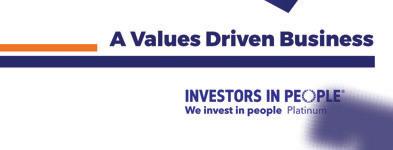
























If it’s of interest to the Irish Construction Professional then it’s of interest to ‘Construction Management Ireland’.






































Cmi Construction Management Ireland Construction Management Ireland: Building – on our mutual strengths i ConstructionManagementIreland June/July2018 | OnTop OfTheir GameSetting standards withDuggan Brothers’ team i Construction Management Ireland Winter 2018 i Construction Management Ireland Autumn 2019 | THE RIGHT STUFF Training For The Future At Sisk Personal relationships withcustomers have always beencentral to Layher’s success –because by understanding your we think wecan provide the best access and So why not get to know us a Just call 041 9823661 or email at info@layher.ie Cmi Construction Management IrelandYEARBOOK 2019 but in system Solutions” ARCHITECTS SURVEYORS PROJECT MANAGERS CONTRACTORS Cmi ConstructionManagementIreland Summer 2021 |
Pat O’Donnell & Co. have spent more than fifty years bringing the best construction and plant equipment manufactured worldwide into Ireland.
In the next fifty years Pat O’Donnell & Co. will be focusing on not only the best but the ‘greenest’ machines also.
Volvo Construction Equipment are at the forefront of innovation and committed to building the world we want to live in.

Volvo CE has already brought to market 5 electric compact machines – the L20 Electric, L25 Electric EC18 Electric, ECR 18 Electric, and the ECR25 Electric.
Innovative
These latest innovative machines are the next step forward in the company’s ambition to reach net zero value chain greenhouse gas emissions by 2040 –alongside development of hydrogen fuel cell solutions and more sustainable internal combustion engine products.
Volvo CE are not stopping with Compact Equipment and right now the manufacturer and its customer Skanska are turning the quarrying industry upside down with a ground-breaking study to create the world’s first ‘emission-free’ quarry.
Drawing on the electromobility and automation expertise of the Volvo Group, the research project, dubbed Electric Site, aims to electrify each transport stage in a quarry –from excavation to primary crushing, and transport to secondary crushing –although a negligible amount of diesel power will still be used.
The system’s efficiency, safety and environmental benefits are set to impact both customers and society at large.
Viability
The viability of the Electric Site research project has been tested over 10 weeks at Skanska’s Vikan Kross quarry, near Gothenburg, Sweden.
The results are even better than expected.
The tests showed a 98% reduction in carbon emissions, a 70% reduction in energy cost and a 40% reduction in operator cost.
handlers for over thirty years.
In addition to reducing operating costs by up to 50 % compared with conventional diesel engines, there are many other benefits that mean the machine quickly pays for itself.
Future-oriented electrohydraulic drives not only operate cost-effectively but are also kind to the
be used independent of location with integrated cable drums, power pack devices, integrated power packs or ceiling power supplies and are perfectly suited to indoor use.
Sennebogen’s Hybrid and Electric Material Handlers Range comprises of twenty machines covering reach heights from 9 m to 42 m.
Proud
Pat O’Donnell, managing director, Pat O’Donnell & Co: ‘We are proud to bring the leaders in green technology to the Irish plant market and like our suppliers we are looking at ways that we can mirror their commitment to a more sustainable future.
‘We are delighted to announce that we have engaged our first qualified electrician to insure we maintain the highest level of customer service available in the industry.
‘We have also created
PAT O’DONNELL & CO.
BRINGING GREEN MACHINES TO IRISH SITES
The results also indicate that the Electric Site project takes a big step towards helping Volvo CE achieve its future vision where work sites are ten times more efficient, with zero accidents, zero unplanned stops and zero emissions.
Together, these results support the potential for a 25% reduction in total cost of operations.
Innovation
Sennebogen has been an innovation leader in electrically powered material
environment. The engines are environmentally friendly and do not produce emissions or exhaust gases.
More comfortable
Electric material handlers are significantly more comfortable for operators as the drive is vibration free and low noise.
This also means all the components have a longer service life.
In addition to stationary applications, electric material handlers can also
a new position of Environmental & Quality Manager.
‘We are currently undergoing a complete carbon footprint analysis and are excited by the prospect of how we can reduce our emissions and environmental impact.
Family-run
‘As a family run business and with many of our customers being similarly family-run it is incumbent on us to invest in all areas of sustainability for our grandchildren.’
Spring/Summer 2022 | Construction Management | 55 PRODUCTS & SERVICES
Why emotionally intelligent leaders avoid the 'Feedback Sandwich'
Want to provide feedback that actually makes a difference? Discard the oldschool feedback formula and embrace benevolent honesty instead. So says Jeff Haden
Most of us were taught to deliver constructive feedback by using the feedback sandwich: Start with a positive, share the negative, close with a positive.
Unfortunately, the feedback sandwich is always tough to swallow.
Prepared
Like the time a boss told me, ‘I really appreciate how you always come prepared to the supervisor meetings.
‘But you sometimes run over everyone else with all your facts and figures and productivity results.
‘Still: You're a really valuable member of the team.’
The meat of the sandwich – the ‘you run over everyone else with your facts and figures’ – was admittedly true.
But the bread – the two positives –didn't soften the blow.
Negative feedback
In effect, the sandwich says, ‘I need to give you negative feedback...but first I'll say something nice so you won't think I hate you.
‘And then I'll say something nice so you won't be mad at me when you leave.’
That's the problem with the feedback sandwich. The recipients feel manipulated.
And even if at first they don't, give it time: Since our positive qualities tend to stay consistent, the same bread eventually starts to taste stale.
And as for the likelihood of positive change? According to research published in 2018 in ‘Management Review Quarterly’, the feedback sandwich almost always fails to correct negative or subpar behaviours.
If only because, as in my case, I focused more on how the feedback was delivered than on the quality and accuracy of the feedback itself.
Benevolent honesty
The better approach is what the authors of a study published in ‘Current Opinion in Psychology’ call ‘benevolent honesty’.
As the researchers write: We propose that that a better approach is benevolent honesty, in which communicators focus on delivering negative information truthfully and directly, but also employ additional strategies to ensure that their words actually lead to long-term improvement.
For example, a professor might emphasize that a student is capable of achieving high standards when giving
study conducted in 2014 that shows including one sentence can make feedback up to 40 percent more effective:
‘I'm giving you these comments because I have very high expectations and I know that you can reach them.’
According to Culture Code author Daniel Coyle, that phrase contains three distinct signals:
You are part of this group.

This group is special; we have higher standards here.
I believe you can reach those standards.
Instead of a feedback sandwich, the result is more like a relationship sandwich.
No manipulation. No platitudes. Not irrelevant compliments. No false hope.
Just clear, direct feedback –delivered inside a message of connection, belonging, and trust.
That's the real difference between a feedback sandwich and benevolent honesty.
Helps
The feedback sandwich theoretically helps the feedback giver reduce the likelihood of conflict during a tough conversation. (‘If I throw in a few compliments, maybe he won't get mad’)
But how a difficult conversation might feel to the person giving feedback doesn't matter.
The only thing that matters is whether the feedback helps the recipient improve his or her performance.
And that's something a feedback sandwich is terrible at producing.
The next time you need to have a difficult conversation with an employee – or with anyone – forget the feedback sandwich. Forget leading and closing with a compliment.
critical feedback.
Though this strategy might seem intuitive, communicators often fail to make their benevolent intentions clear – they seem to forget (at least in the moment) that (others) do not have access to that same information.
Findings
Direct and truthful Instead, just be direct and truthful... while showing that you care about that person's performance or wellbeing because you care about them.
That you want things to be better for them as a result of the conversation.
Not just to be easier for you.
The opinions expressed here by Inc. com columnists are their own, not those of Inc.com.
Jeff Haden, contributing editor, inc.@ jeff_haden
Their findings dovetail nicely with a ‘YOU WANT THINGS TO BE BETTER FOR THEM AS A RESULT OF THE CONVERSATION.’
THE FINAL SAY... 56 | Construction Management | Spring/Summer 2022


